Reading Groups
PPE Undergraduate Reading Groups
Spend a semester reading and talking about an important PPE book with a group of smart students and a discussion leader. The groups are open to active UNC students, who meet for eight (8) weeks, ending early enough that they won’t conflict with the end of the semester crunch. The PPE Program provides copies of the books to all participants, dinners at Gourmet Kingdom, and an engaging group leader. All meetings take place at 6:00pm on weeknights by default, but starting times may vary from group to group.
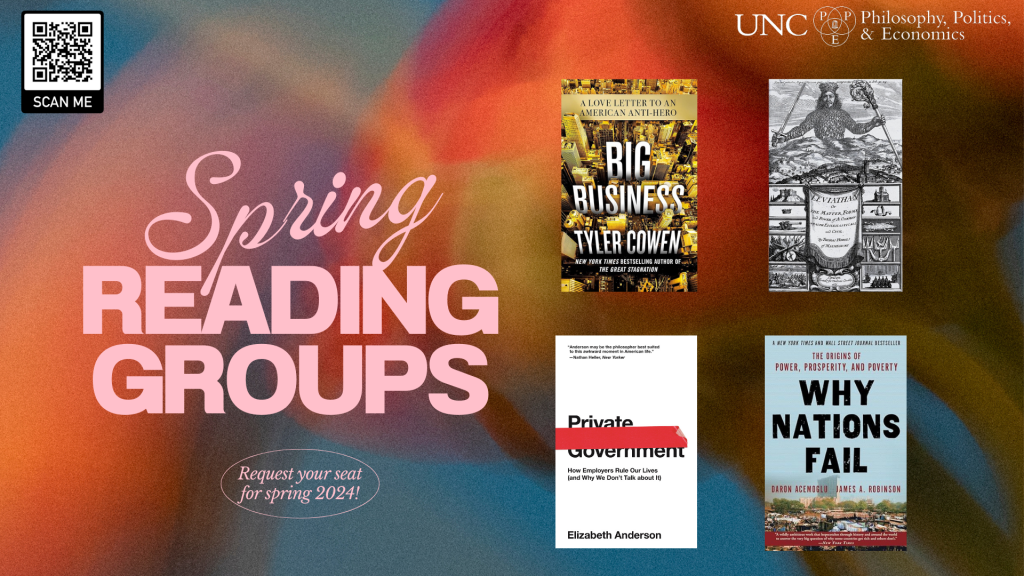
Check out blurbs for the Spring PPE Reading Group selections, along with linked information about each reading group leader, below. *Priority seating will go to PPE minors and interested non-PPE minors who are eager to participate and who have not participated in a reading group before.*
The Seat Request Form is now closed. Check back next semester!
GROUP DESCRIPTIONS
Big Business: A Love Letter to an American Anti-Hero
By Tyler Cowen
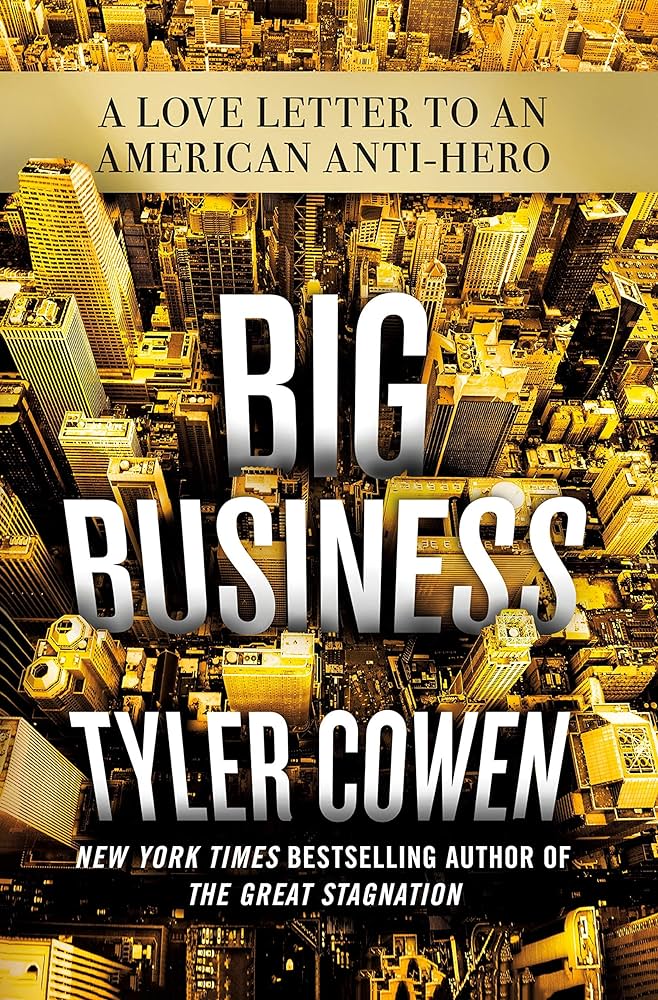
Semester: Spring 2024
Group Leader: Erik Zhang, Teaching Assistant Professor
For many, “big business” and “corporate America” are dirty words. This seems especially true amongst people in the younger generations. Indeed, according to one study, a majority of 18- to 29-year-old Americans do not even support capitalism. In the face of such strong anti-business sentiments, economist Tyler Cowen hopes to convince you that businesses and corporations have an essential role to play in maintaining a balanced, productive, and progressive society. In this reading group, we will critically analyze Cowen’s impassionate defense of big business, working through his various arguments that corporations have been misunderstood, undervalued, and under-appreciated by the larger public. Who knows? Perhaps by the end of the reading group, you too will confess your love for big business!
Leviathan
By Thomas Hobbes
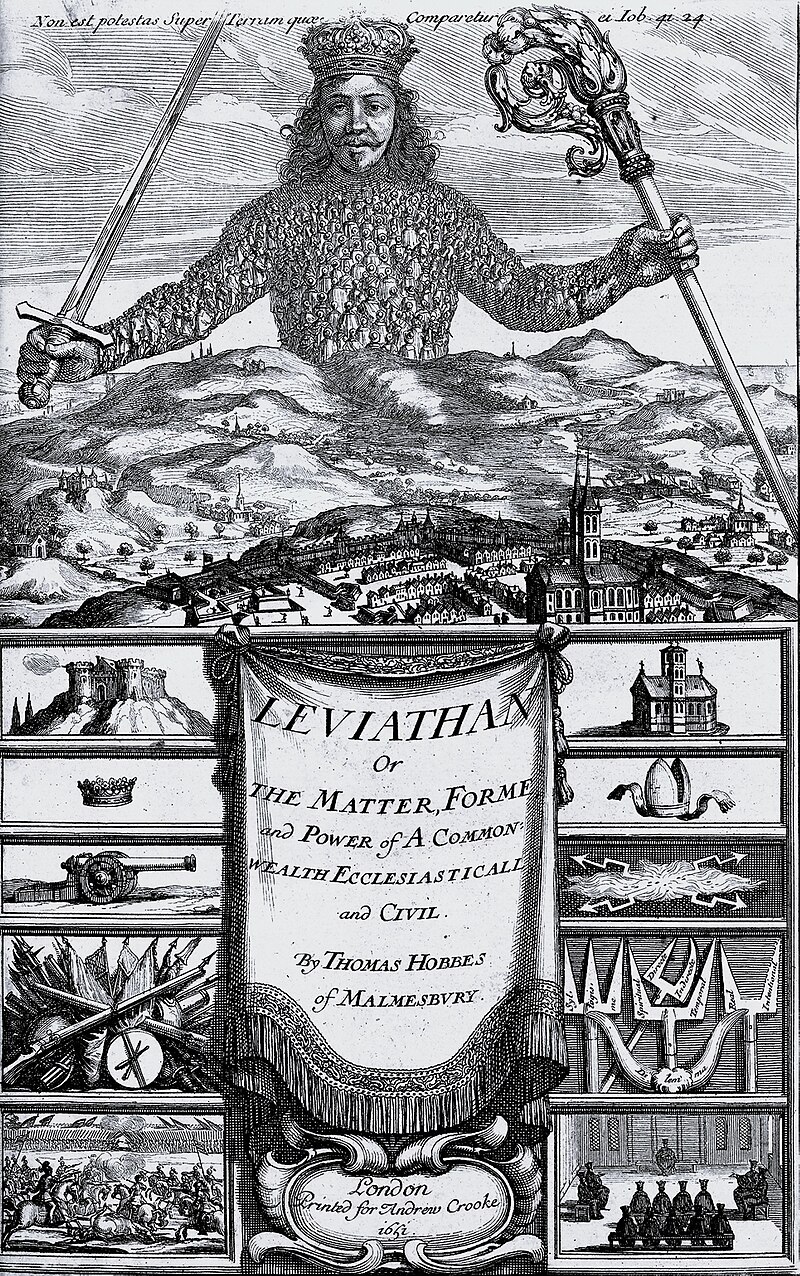
Semester: Spring 2024
Group Leader: Samuel Dishaw, Teaching Assistant Professor
What justifies the power that political institutions have over us? In Leviathan, Hobbes approaches this question by arguing that a political arrangement is legitimate if it would be freely chosen by rational agents. This device of a “social contract” marks a watershed moment in the history of political thought. In this reading group, we will pay close attention to the form of social contract theory that Hobbes developed, and the political arrangements he thought followed from it. We will also attend to other striking aspects of Hobbes’ philosophy, such as his views on rationality and human nature, and the role these play in the overall argument of Leviathan.
Private Government
By Elizabeth Anderson
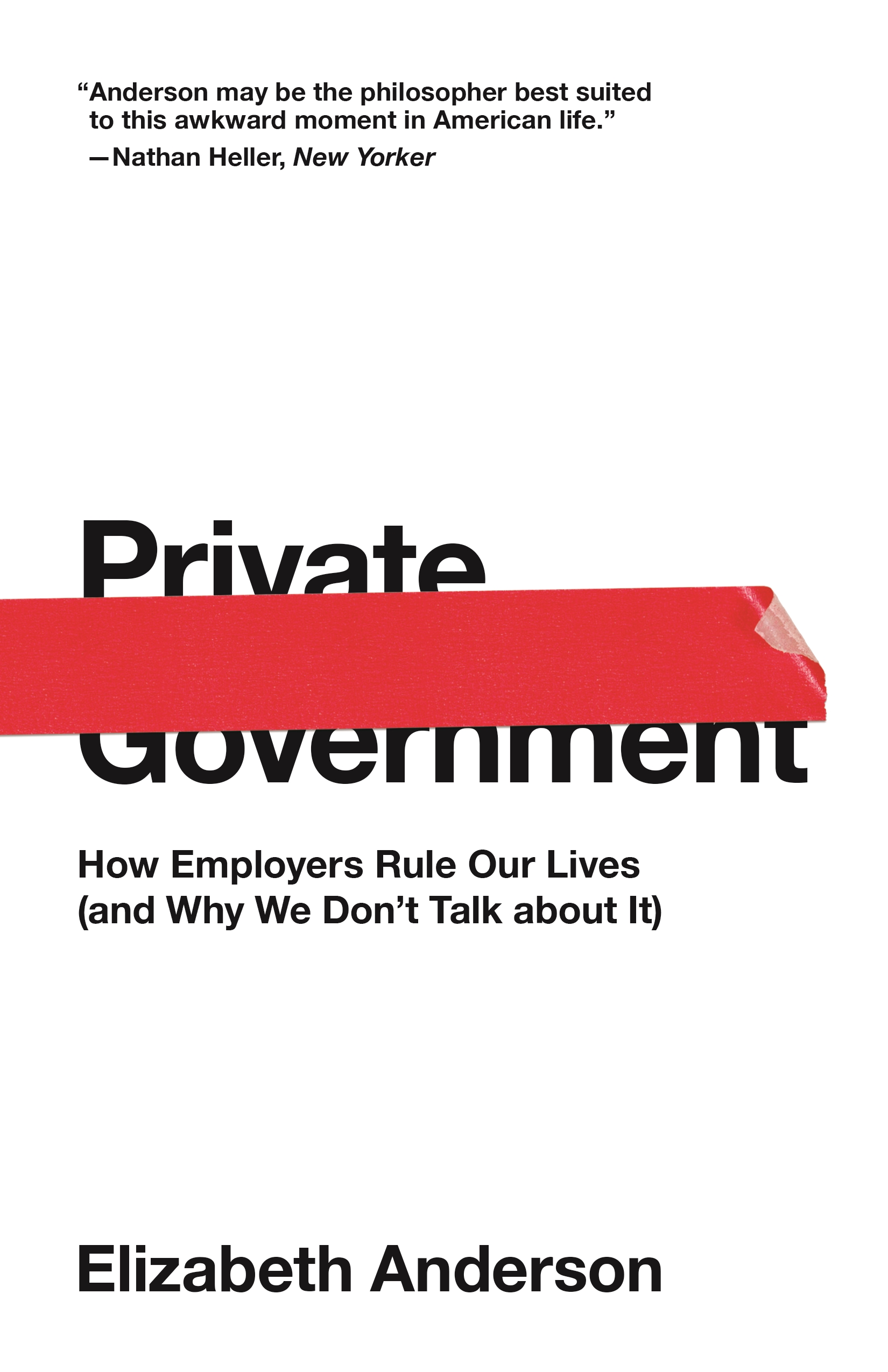
Semester: Spring 2024
Group Leader: DeeAnn Spicer, Graduate Student
In Private Government, Anderson challenges us to examine the ways in which private corporations can function as de facto governments, shaping our lives and influencing our choices. Anderson explores the complexities of private power and its impact on individual autonomy, labor relations, and societal dynamics. Before arguing that workplaces operate as unrecognized "communist dictatorships" in our midst, Anderson first goes over why we still think that the free market gives us a free and equal society. We will learn about how the Industrial Revolution changed the social context that egalitarians such as Adam Smith, John Locke and Thomas Paine imagined when thinking about how to achieve a free society of equals.
The latter half of the book consists of four responses, from scholars in other disciplines, to Anderson's arguments. Lastly, there is the author's response to her commenters. This format allows us to enter into an existing and ongoing dialectic with some idea of the different possible perspectives in the conversation.
Why Nations Fail: The Origins of Power, Prosperity, and Poverty
By Daron Acemoglu, James A. Robinson
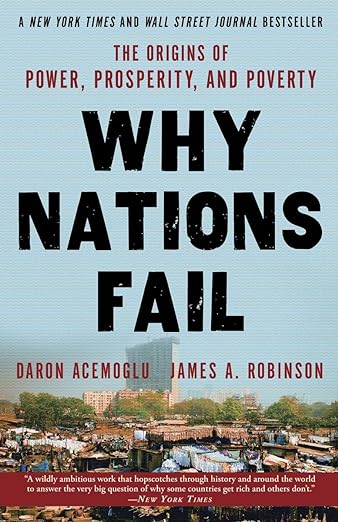
Semester: Spring 2024
Group Leader: Will Kanwischer, Graduate Student
Some nations are rich, and some are poor. In some places, the 20th century brought an historically unprecedented increase in wealth and prosperity. In other places, economic growth has been slow, and many people remain below the poverty line. What explains why some nations have succeeded at lifting their citizens from poverty while others have failed?
In Why Nations Fail, Daron Acemoglu and James Robinson suggest a simple answer: political institutions. Acemoglu and Robinson argue — using both quantitative economic data and historical case studies — that national differences in wealth can be explained by the character of a nation’s political and economic arrangements. According to the authors, countries with “extractive” institutions find themselves trapped in cycles of poverty and stagnation, while nations with “inclusive” governments and economies are able to harness the efficiency and power of markets to create wealth.
The consequences of this argument are striking. If the analysis offered in Why Nations Fail is correct, poverty is largely a problem of our own making. More optimistically, Robinson and Acemoglu suggest that poverty is an issue that it is within our power to solve.
Capital, Volume I
By Karl Marx
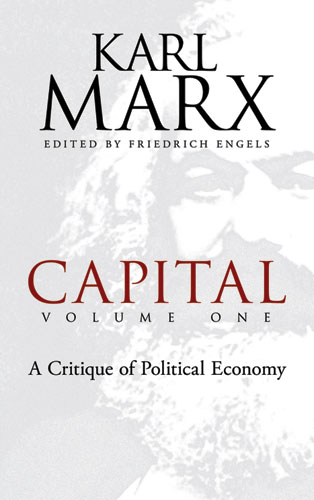
Semester: Fall 2023
Group Leader: Zach Ferguson, Graduate Student
Marx was one of the most influential thinkers of the last 200 years, forever changing philosophy, economics, politics, and world history. He is also without a doubt one of the most misunderstood figures in American political discourse—rarely read, but frequently maligned. If you’ve heard of Marx’s ideas secondhand, chances are you’ve only heard the cartoonishly simple, easily dismissed strawman version. In this group we will go directly to the source—we will take Marx’s ideas seriously and consider them critically.
Though he is best remembered for his criticisms of capitalism and liberalism, it is easy to overlook that Marx was first and foremost an economist and a social scientist. In his magnum opus, Capital, Volume I, he presents the culmination of several decades’ worth of careful study of empirical data to criticize the most prominent economic theories of the day. One of his great achievements was showing that capitalism is not a law of nature, but rather a particular mode of production that arose in response to historical forces. Though unassuming on its face, this claim has revolutionary implications: If there was economic life before capitalism, that opens up the possibility that there might yet be economic life after capitalism.
In this reading group, we will read a good chunk of Capital, Volume I, with an emphasis on the historical development of the capitalist mode of production, as well as some other influential writings by Marx. We will end by considering selections from Thomas Piketty’s groundbreaking Capital in the Twenty First Century to see how some lessons from Marx can be applied to contemporary economics. Along the way, we might solve the great mystery of how it is possible for capitalists to make a profit (spoiler alert: by your hard work!)
Expert Political Judgement
By Philip Tetlock
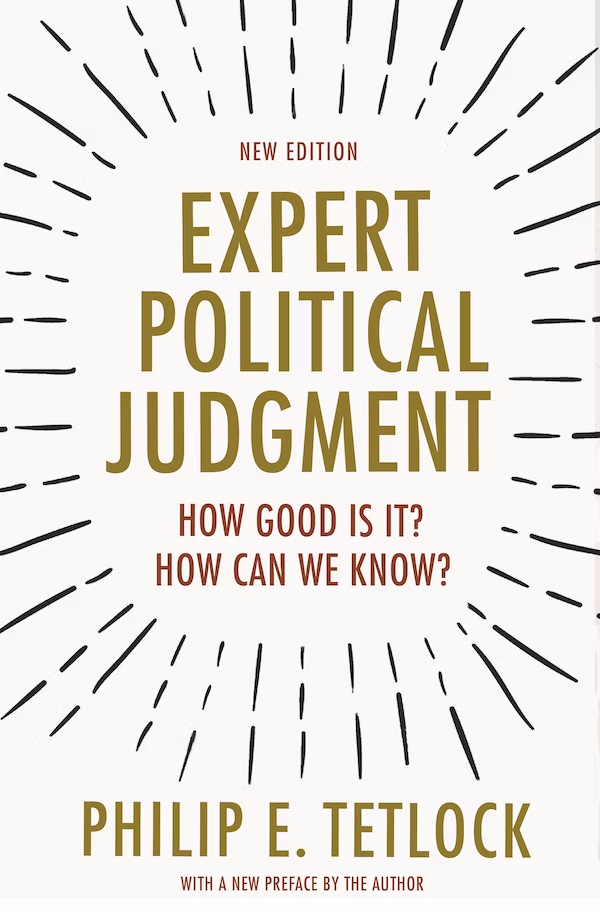
Semester: Fall 2023
Group Leader: Gerard Rothfus, Teaching Assistant Professor
When debating controversial PPE topics, from international wars to global pandemics, political “experts” are known for making highly confident yet wildly divergent predictions about how the future will unfold. How might we go about holding such experts intellectually accountable by rigorously and impartially testing the accuracy of their judgments? And would such testing, if feasible, reveal any intellectual habits or forecasting techniques typically associated with successful political prediction?
In Expert Political Judgment , political scientist Phillip Tetlock summarizes his decades-long research into such questions, using lessons learned from extensive forecasting tournaments to offer a provocative account of the logic and psychology of human judgment regarding matters political. Straddling the line between pessimism and optimism regarding our species’ predictive talents, Tetlock's work aims to illuminate both the pitfalls and opportunities inherent in the enterprise of political forecasting, ultimately offering tools and suggestions that may even enable the members of this reading group to improve their own skills as forecasters of various phenomena.
The Case for Rage
By Myisha Cherry
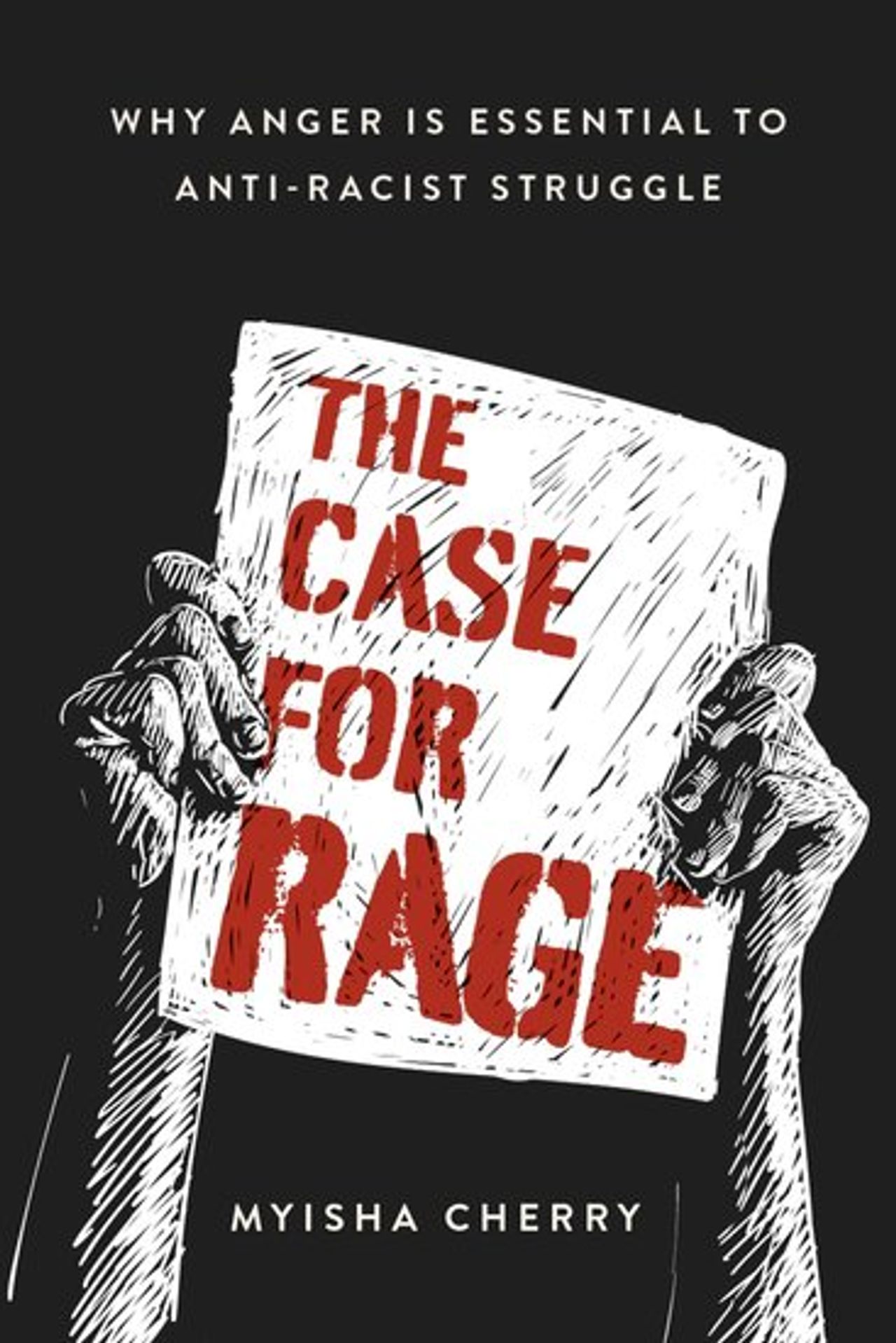
Semester: Fall 2023
Group Leader: Logan Mitchell, Graduate Student
Anger has a bad reputation, one that Myisha Cherry argues is unwarranted. In The Case for Rage, Cherry argues that anger is not only a justified response to racial injustice - it is essential to the success of anti-racist movements. To make her case, Cherry draws on a diverse pool of inspiration, from Black feminist thought to Aristotle to contemporary social psychology. Cherry argues that a particular form of anger she titles “Lordean rage” (after Audre Lorde) has an important role to play in fighting racism, and we should actually cultivate it instead of simply trying to calm down.
The Case for Rage is so much more than an academic philosophy project. The book also helps to form a practical toolkit for activists and allies striving to create a more compassionate, just world. This book is sure to have something to offer anyone interested in better understanding the role that emotions can play in our own lives on both a personal and political level.
The Subjection of Women
By John Stuart Mill
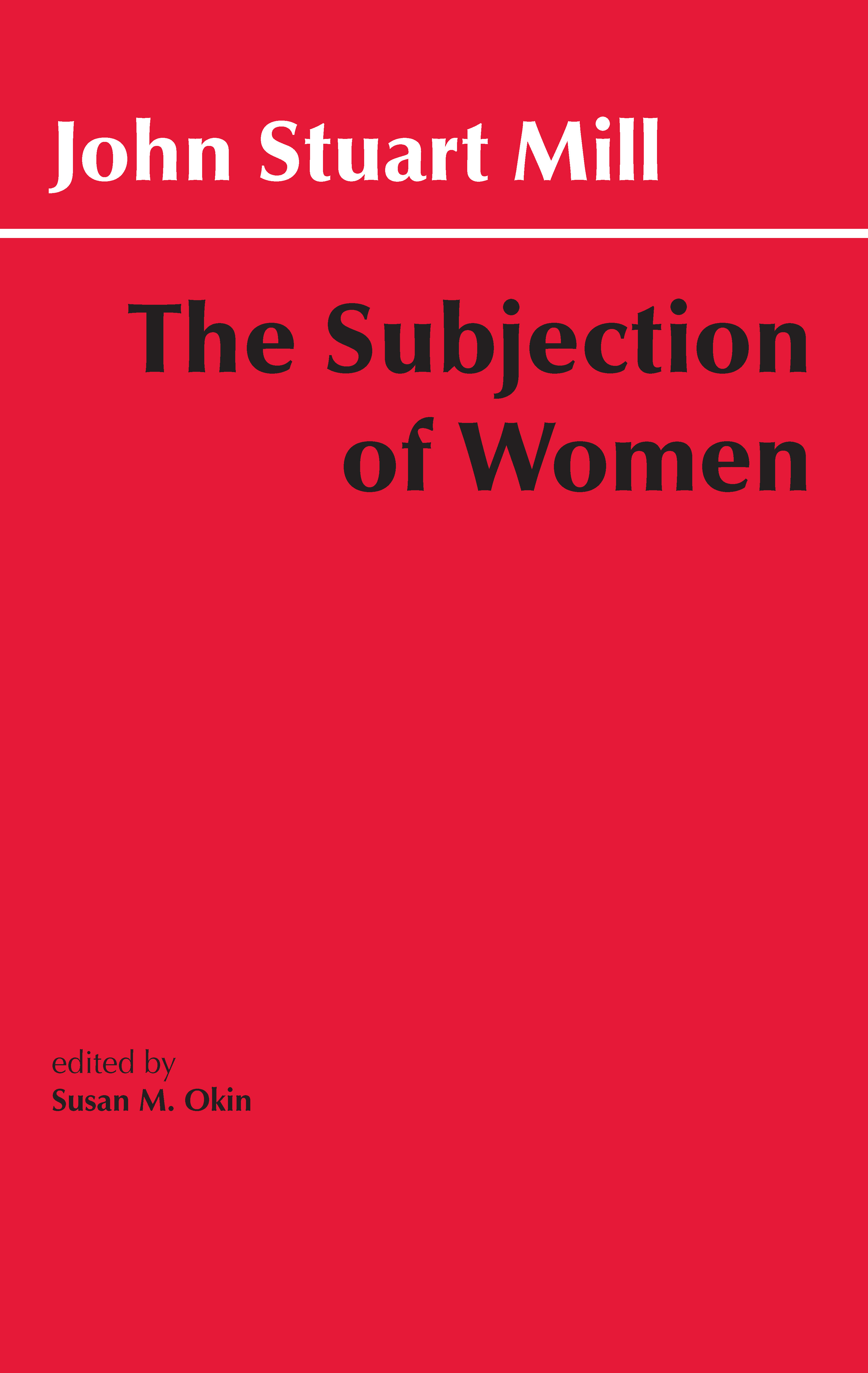
Semester: Fall 2023
Group Leader: Meredith Sheeks, Graduate Student
Imagine a world where a woman’s best career option is to marry a man. As soon as she’s married, all of her hard-earned wages legally become her husband’s. A woman in this world cannot legally own property, form a contract, make a will, or sue another soul. She has little to no legal protection against sexual or physical abuse from her husband. In this world, a woman’s best pathway forward is to subject all of her life and belongings to a man.
Believe it or not, in 1861, this imagined world was real. It was called “England.” And just 162 years ago, this was the world J.S. Mill inhabited when he penned The Subjection of Women.
The Subjection of Women is a sustained attack against the exclusion of women from various legal rights, statuses, and protections. Crying out against the prevailing opinion of his day, J.S. Mill calls the legal status of women as he sees it: the only remaining example of legal slavery in the modern Western world. And slavery anywhere is an impediment to human progress everywhere. The legal subordination of women to men is wrong, Mill argues, and our evidence suggests that we would all be better off if women were set free.
The Idea of Prison Abolition
By Tommie Shelby
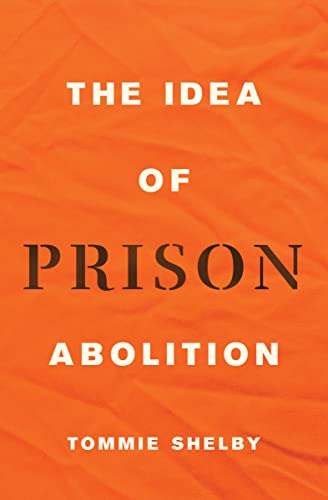
Semester: Spring 2023
Group Leader: Daniel Muñoz, Assistant Professor
In recent years, Americans have been reckoning with fundamental questions about the role of police and prisons in society. Are our problems with criminal justice a matter of bad apples, or is the system rotten all the way to its roots? Could we imagine a world without incarceration? Should we make that world a reality?
In The Idea of Prison Abolition, Tommie Shelby takes a sympathetic yet skeptical look at the arguments of prison abolitionists. Ultimately, Shelby defends the legitimacy of prisons, suitably reformed, as a method for controlling crime, but he believes that the insights of Black radicals like Angela Davis cannot be ignored, and that we should take up their challenge to "think beyond bars."
The Rise and Decline of Nations
By Mancur Olson

Semester: Spring 2023
Group Leader: Kirun Sankaran, Teaching Assistant Professor
In 2022 San Francisco made plans to put a public restroom in a square in the Noe Valley neighborhood. The price tag? $1.7 million. The first phase of the Second Ave Subway in New York, stretching 1.8 miles, from 72nd to 96th St., cost $4.5 billion (or roughly 73,000 UNC postdocs). Why is it so hard for governments in rich countries to build anything?
In his classic The Rise and Decline of Nations, Mancur Olson argues that in rich, stable societies, interest groups will seek to capture rents from government actions. As those groups grow more entrenched, it becomes harder to adopt new technologies and modify institutional forms. Olson's insights help us understand the institutional stagnation we see across advanced democracies, as well as paths to reform. They're also vital for any philosopher interested in issues of distributive justice.
The Road to Serfdom
By F.A. Hayek
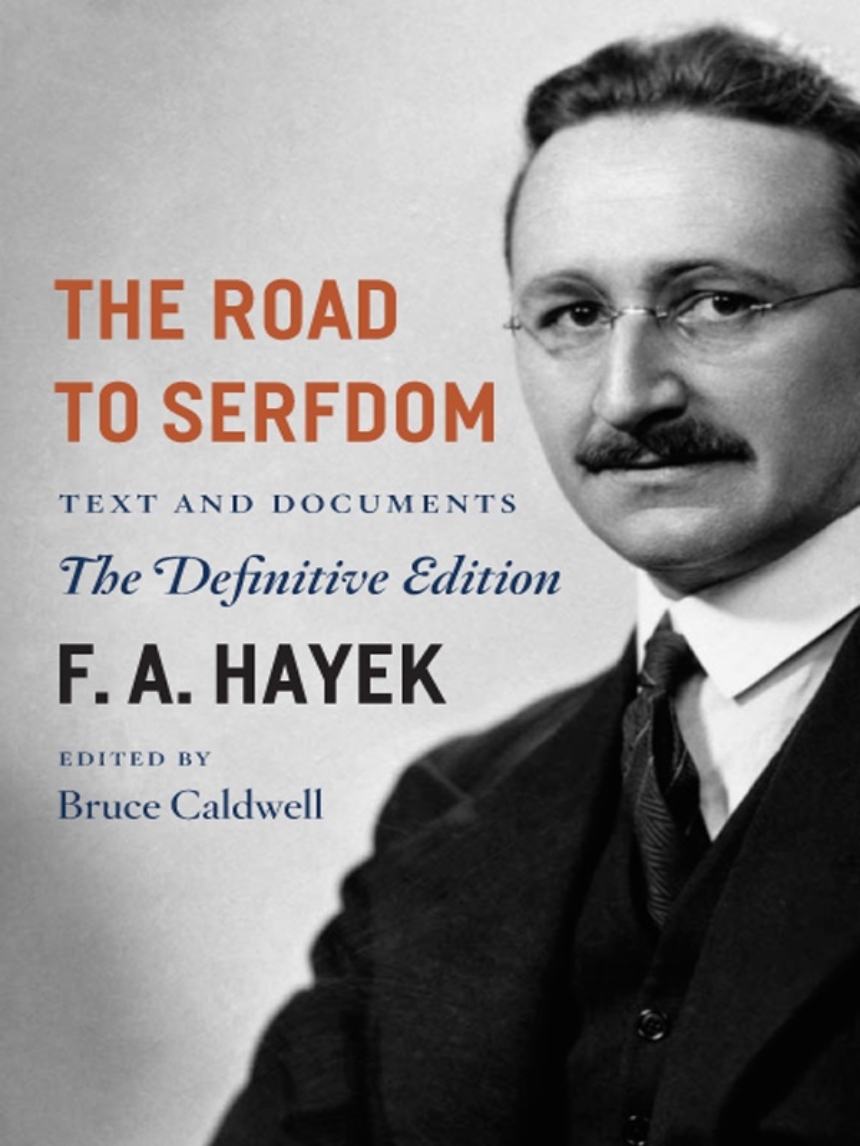
Semester: Spring 2023
Group Leader: Z Quanbeck, Graduate Student
Written during World War II amidst fierce debates between proponents of capitalism and proponents of socialism, F.A. Hayek’s The Road to Serfdom articulates one of the twentieth century’s most important critiques of socialism and centralized economic planning. Since its publication in 1944, The Road to Serfdom has had a tremendous influence in shaping libertarian and (more broadly) classical liberal thought. Yet John Maynard Keynes himself described it as a “grand book” expressing a philosophical perspective with which he found himself in “deeply moved agreement.” Hayek’s discussion of the value of decentralized knowledge in market economies and the unintended negative consequences of centralized economic planning are worth carefully attending to and grappling with today.
In this reading group, we will both aim to understand Hayek’s ideas on their own terms in their historical context and consider whether, in light of technological, political, and economic changes since 1944, Hayek’s account of the relationship between markets, freedom, and the state holds lessons relevant to our contemporary world.
Why Does Inequality Matter?
By T.M. Scanlon
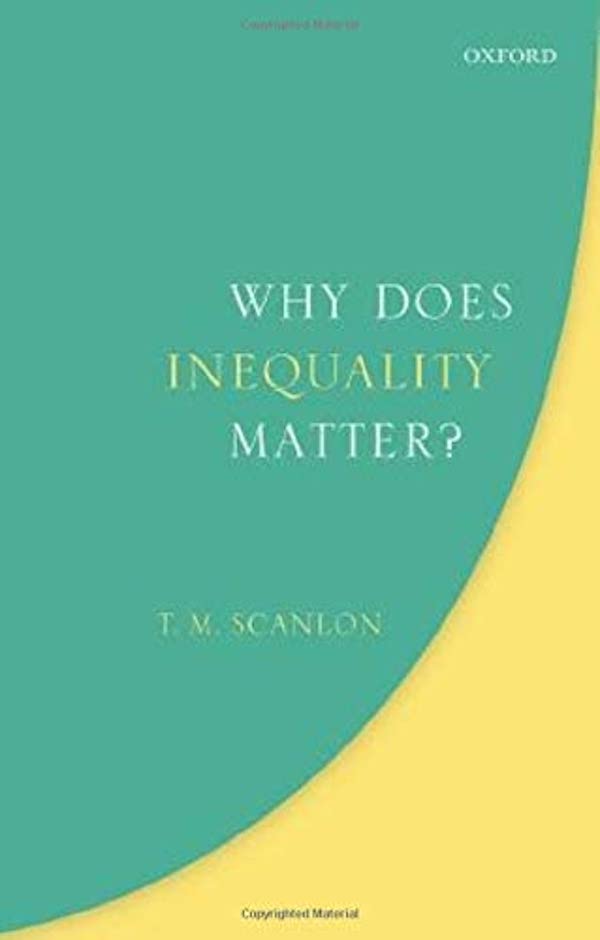
Semester: Spring 2023
Group Leader: Erik Zhang, Teaching Assistant Professor
We currently live in a world that is characterized by great economic, social, and political inequalities. But are these inequalities objectionable? And if so, what makes them objectionable? Consider two simple lines of thought regarding economic inequality. On the first, it is readily granted that the poor should be helped. However, what is of moral concern here is not that the poor have less compared to the rich, but that they simply do not have enough. As Harry Frankfurt once quipped, when one is asked “How are your children?” one does not say in response, “Compared to what?” On the second, it is oftentimes maintained that economic equality can be sustained only at the cost of interfering with the liberties of individuals to make choices, take risks, select careers, and enter contracts. Perhaps equality has some attractions, but is not sacrificing our individual liberty for it even more objectionable?
In this reading group, we will methodically walk through a wide variety of arguments about social, economic, and political inequalities as laid out by Harvard philosopher T.M. Scanlon in his book Why Does Inequality Matter? Our attention, however, will not solely confined to the narrow issue of inequality, but will extend to broader topics in distributive justice, political fairness, social power, as well as individual desert and responsibility.
Debt: The First 5000 Years
By David Graeber
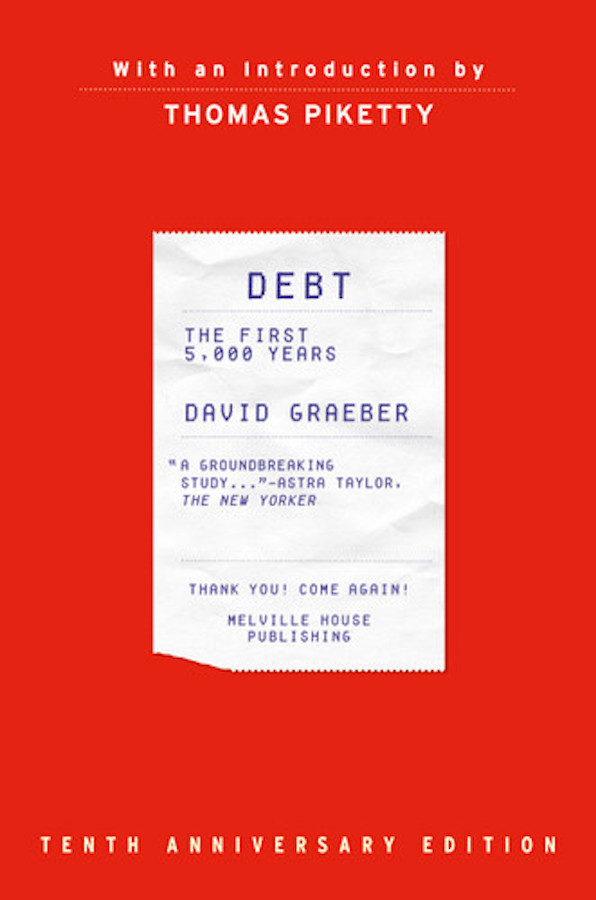
Semester: Fall 2022
Group Leader: Pavel Nitchovski, Visiting Teaching Assistant Professor
Debt is a ubiquitous feature of American life. Indeed, many of you may already be in debt to the university, a car dealership, an insurance company, or a mortgage broker. How did this happen? And how did the very institution of debt come to be? The standard story goes like this: in the beginning there was barter of equal goods in a marketplace. Those who had extra sheep but needed corn would come to the market to trade directly with those who had corn but no sheep. With time, however, the system of bartering proved to be too cumbersome to sustain. So, instead of bringing and trading large, cumbersome objects, we introduced the practice of exchanging small tokens representing the value of those goods—hence, the invention of money. Debt, then, first arrives on the scene when and because people who didn’t have enough money to exchange for goods and services were able to negotiate a deal. Simply put: the satisfaction of various needs leads to bartering, which leads to money, which leads to debt.
According to anthropologist David Graeber, this story is not only intuitive and appealing, but also completely wrong. In this reading group, we will explore Graeber’s argument as he takes us through the history of money and debt, using the latest anthropological and historical data. Our goal will be not only to understand the true history of human economic development, but to also re-examine and re-evaluate our relationship to debt. Graeber’s book is a powerful and rich text that is a must-read for anyone who wants to get a deeper understanding of the intersection between economics and politics. Reading expectations are about 25-30 pages a meeting.
Orientalism
By Edward W. Said
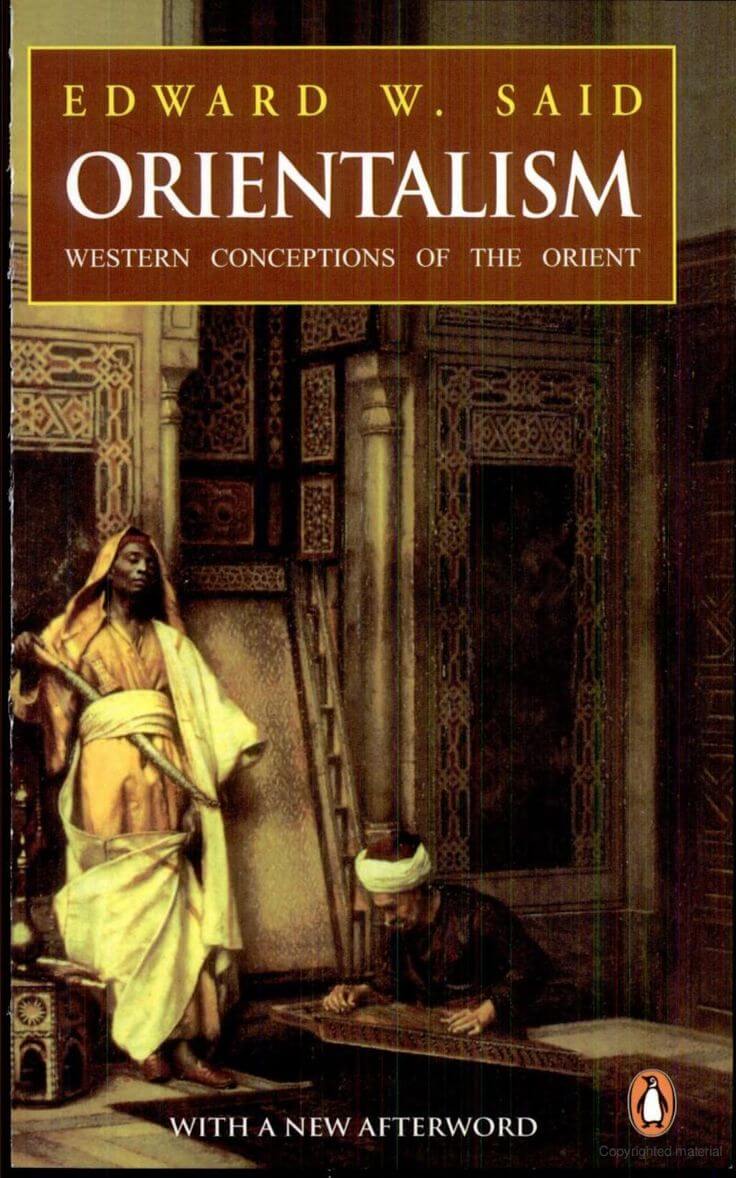
Semester: Fall 2022
Group Leader: Genae Matthews, Affiliated Grad Student
From the resurgence of the Taliban in Afghanistan to more recent controversy stirring about the status of Taiwan, we witness the turbulent ebb and flow of empire and decolonization everywhere. Yet today's headlines often obscure the sense in which such events are precipitated by and grounded in a long-standing tradition of Western attitudes towards 'the East.'
In Orientalism, Edward Said coins the titular term as a critical concept to describe the West's often contemptuous depictions of the East. In particular, he argues that such depictions often promote Western superiority, exaggerate difference, and portray the East as inherently backwards. Heralded as the foundational text in post-colonial studies, Said's work demonstrates that a truly comprehensive study of social, political, and economic problems must include an introduction to the problems that have arisen (and continue to arise) in virtue of the West's attitudes towards and interactions with the East. This makes Orientalism an essential read for anyone interested in global politics, humanitarian rights, or international affairs, regardless of political leanings.
Responsible Parties: Saving Democracy from Itself
By Frances McCall Rosenbluth, Ian Shapiro
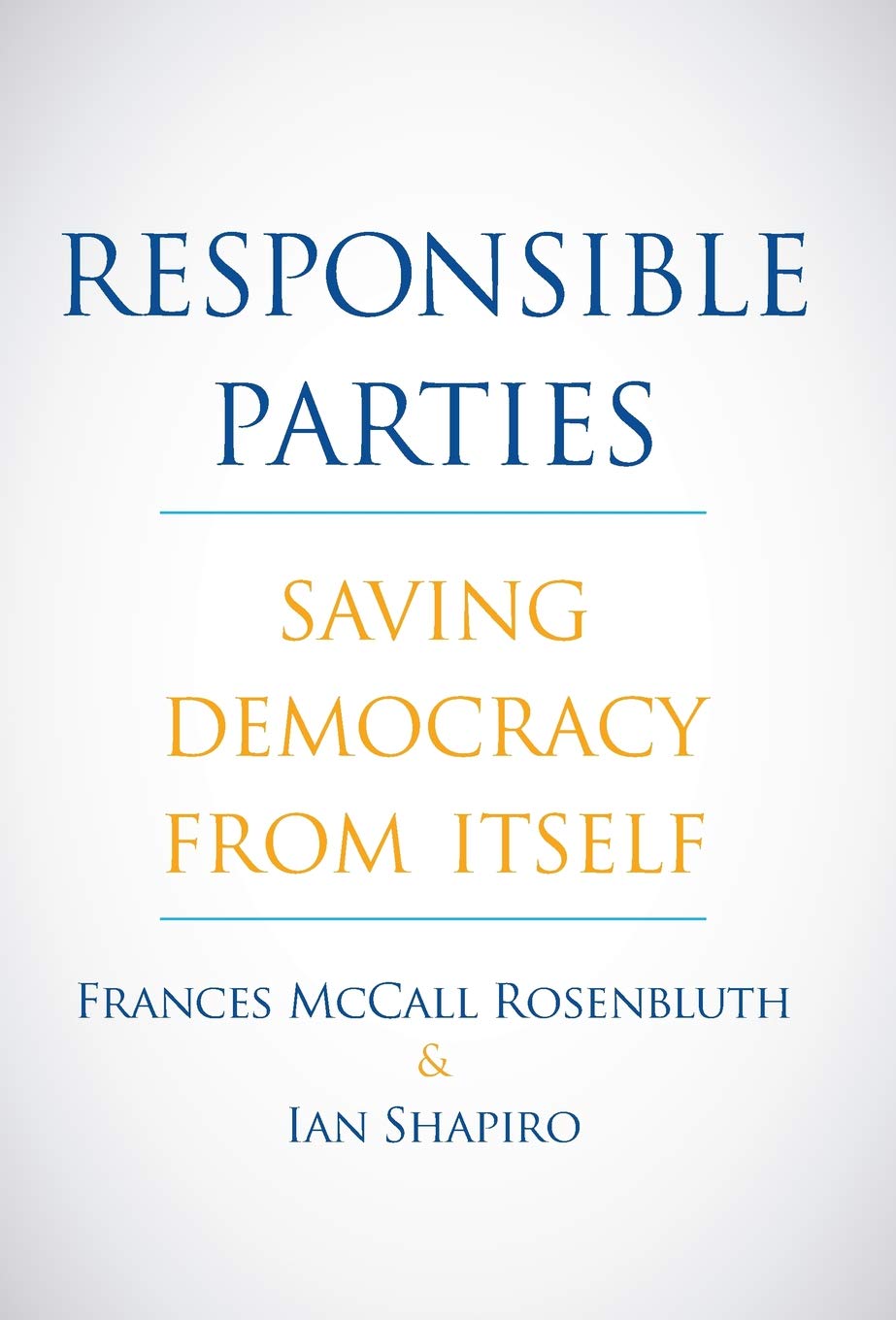
Semester: Fall 2022
Group Leader: Daniel Munoz, Assistant Professor
Democracy is backsliding around the world. Why? The answer, according to Rosenbluth and Shapiro, is not what you think. The problem is that we have fractured and weakened our political parties. In a weak party, the followers can't pick their leaders, and the leaders can't control their followers. In a many-party system, voters often can't control the post-election haggling that results in a coalition government. The result in either case is that the parties are beholden to smaller groups whom they serve at the expense of everyone else. Only with big strong parties do we get a government that serves most of the people most of the time.
This is a beautifully written, deeply researched book, which uses concepts from economics and case studies from politics to challenge some of America's deepest philosophical views about how a government should work. Parties aren't the enemy, as some founders thought; they are essential to our democracy. And we need them big and strong.
The Wealth of Nations
By Adam Smith
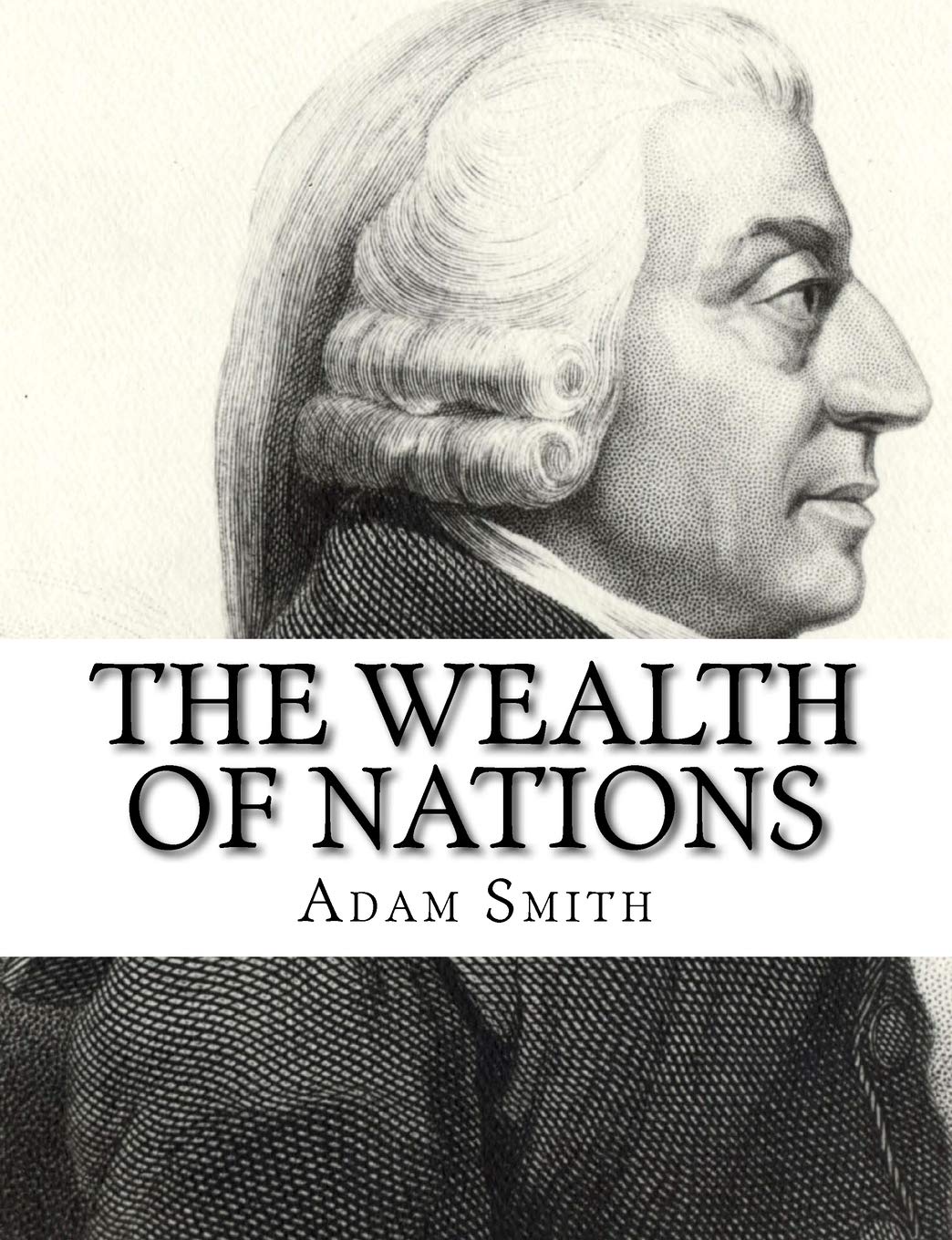
Semester: Fall 2022
Group Leader: Devin Lane, Affiliated Grad Student
Adam Smith’s The Wealth of Nations is not only a centrally important text in the history of economics, but also a paradigm example of intellectual work at the intersection of philosophy, political science, and economics. For this reason, it is particularly worthy of study for anyone interested in PPE.
We will read and evaluate Smith’s reasoning through the lens of PPE. That is, we will be concerned not only with the economic arguments he presents, but with the political and philosophical implications that follow from his conclusions regarding self-interest, the division of labor, taxation, free trade, and the nature of economic value, to name just a few key topics. Doing so will allow us to gain a better understanding of one of the central intellectual traditions that continues to influence thinking in PPE to this day.
Anarchy, State, and Utopia
By Robert Nozick
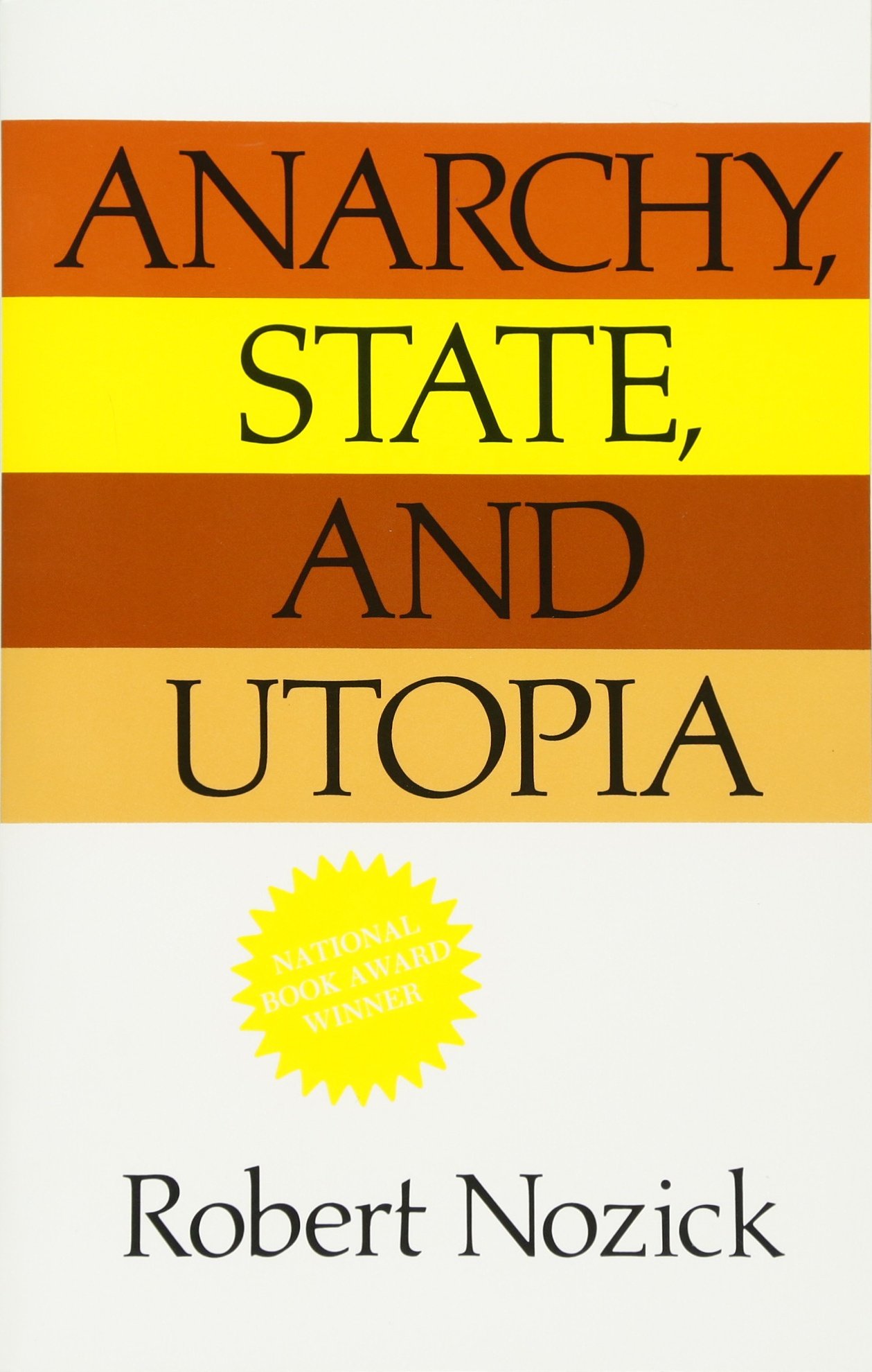
Semester: Spring 2022
Group Leader: Daniel Muñoz, Faculty
What do we need the state for? To this fundamental question of political thought, Robert Nozick answers: "Not much." In Anarchy, State, and Utopia, Nozick defends a more minimal, libertarian conception of the proper role of government, pushing back against the liberal case for redistributing wealth and income. Nozick's critique has been enormously influential in the real world as well as in philosophy, where the book is widely seen as a classic -- infamous, rigorous, hilarious. But like many classics, it is often misunderstood, or remembered only in slivers.
We will read Anarchy, State, and Utopia cover-to-cover in hopes of getting a systematic sense of Nozick's argument: why it matters, where it's strongest, and where it's weakest. We will also, like Nozick himself, undoubtedly get distracted. The road to utopia is beset with interesting tangents.
Democracy in America
By Alexis de Tocqueville
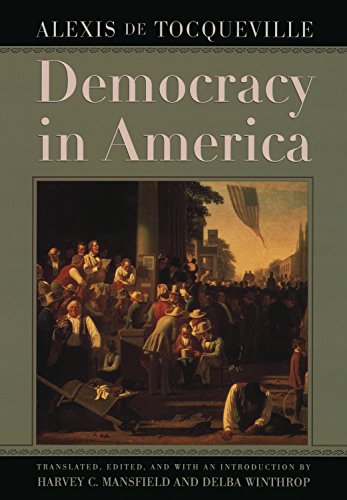
Semester: Spring 2022
Group Leader: Will Kanwischer, Affiliated Grad Student
In 1831, the French government sent a young aristocrat named Alexis de Tocqueville to the United States of America to study the country’s prisons. During his travels, de Tocqueville became fascinated by the Americans’ political culture, and the notes from his trip would eventually be published under the name Democracy in America. Described by Harvard professor of government Harvey G. Mansfield as, “the best book ever written on democracy and the best book written on America,” de Tocqueville’s work is now considered a classic of political science and philosophy.
This reading group will carefully examine and discuss de Tocqueville’s Democracy in America, with special attention to his assessment of the origins, impact, and future of American democracy and society. Of particular interest to us will be de Tocqueville’s diagnosis of the flaws and dangers of democracy and how they compare to the challenges that face liberal democracies today.
Making Space for Justice: Social Movements, Collective Imagination, and Political Hope
By Michele Moody-Adams
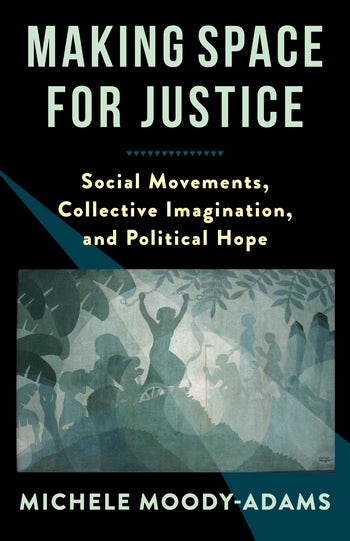
Semester: Spring 2022
Group Leader: Sahar Heydari Fard, Faculty
From nineteenth-century abolitionism to Black Lives Matter today, progressive social movements have been at the forefront of social change. Yet it is seldom recognized that such movements have not only engaged in political action but also posed crucial philosophical questions about the meaning of justice and about how the demands of justice can be met.
Making Space for Justice contends that the insights arising from social movements are critical to bridging the gap between discerning theory and effective practice—and should be transformative for political thought as well as for political activism.
The Broken Ladder: How Inequality Affects the Way We Think, Live, and Die
By Keith Payne
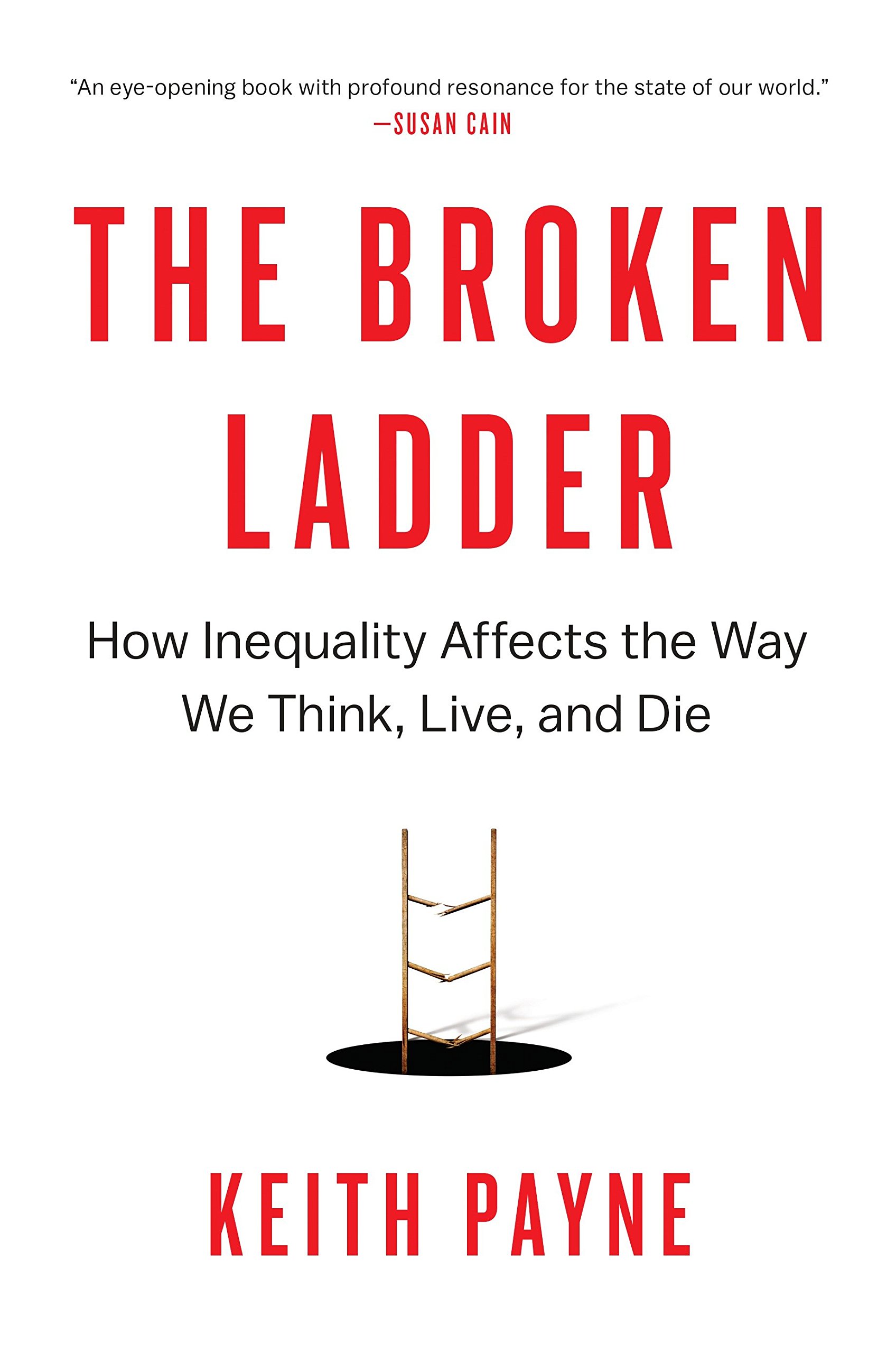
Semester: Spring 2022
Group Leader: Genae Matthews, Affiliated Grad Student
The levels of inequality in the world today are on a scale that have not been seen in our lifetimes, yet the disparity between rich and poor has ramifications that extend far beyond mere financial means. In The Broken Ladder psychologist Keith Payne examines how inequality divides us not just economically; it also has profound consequences for how we think, how we respond to stress, how our immune systems function, and even how we view moral concepts such as justice and fairness.
The Broken Ladder explores such issues as why women in poor societies often have more children, and why they have them at a younger age; why there is little trust among the working class in the prudence of investing for the future; why people's perception of their social status affects their political beliefs and leads to greater political divisions; how poverty raises stress levels as effectively as actual physical threats; how inequality in the workplace affects performance; and why unequal societies tend to become more religious. Understanding how inequality shapes our world can help us better understand what drives ideological divides, why high inequality makes the middle class feel left behind, and how to disconnect from the endless treadmill of social comparison.
Anarchy, State, and Utopia
By Robert Nozick

Semester: Fall 2021
Group Leader: Zach Ferguson, Affiliated Grad Student
Anarchy, State, and Utopia is a provocative and compelling defense of the minimal state and individual rights. In this iconoclastic classic, Nozick challenged many familiar notions in political philosophy and helped spark a surge in contemporary libertarian thought. For those familiar with the work of John Rawls, this work can be seen as a critical counterpoint to the influential Theory of Justice. Contra Rawls’s difference principle, Nozick argues that, given just initial conditions, any distribution that arises from free contract between consenting citizens is just—even highly unequal ones.
The book has won several awards, including the 1975 U.S. National Book Award in the category Philosophy and Religion. The influential nature of the text makes it essential reading for those interested in politics, regardless of political sympathies. In this group we will read the text with a careful and critical eye and assess its relevance for contemporary American political life.
Grandstanding: The Use and Abuse of Moral Talk
By Justin Tosi and Brandon Warmke
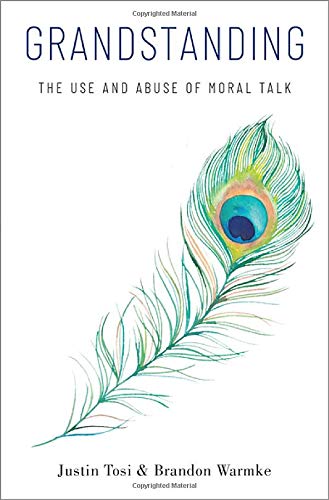
Semester: Fall 2021
Group Leader: Lucia Schwarz, Faculty
Is public discourse in a crisis? Especially in online settings, rational discussion of political and ethical matters seems to have given way to bullying, name-calling, and vitriolic rants. In their recent book, Justin Tosi and Brandon Warmke call on us to do better. Their focus is on the phenomenon of moral grandstanding, which is the use of moral talk to impress others. Grandstanders want to make sure that others think of them as morally respectable people. Unfortunately, in doing so, they often go overboard, making up moral problems and advocating exceedingly strong moral positions.
Drawing on work in economics, political science, and psychology, Tosi and Warmke show that moral grandstanding comes with a variety of social costs, such as increased group polarization and outrage exhaustion. In our reading group, we will discuss and evaluate the authors' arguments and develop our own views regarding the norms that should govern public discourse in this day and age.
The Origins of Unfairness: Social Categories and Cultural Evolution
By Cailin O'Connor
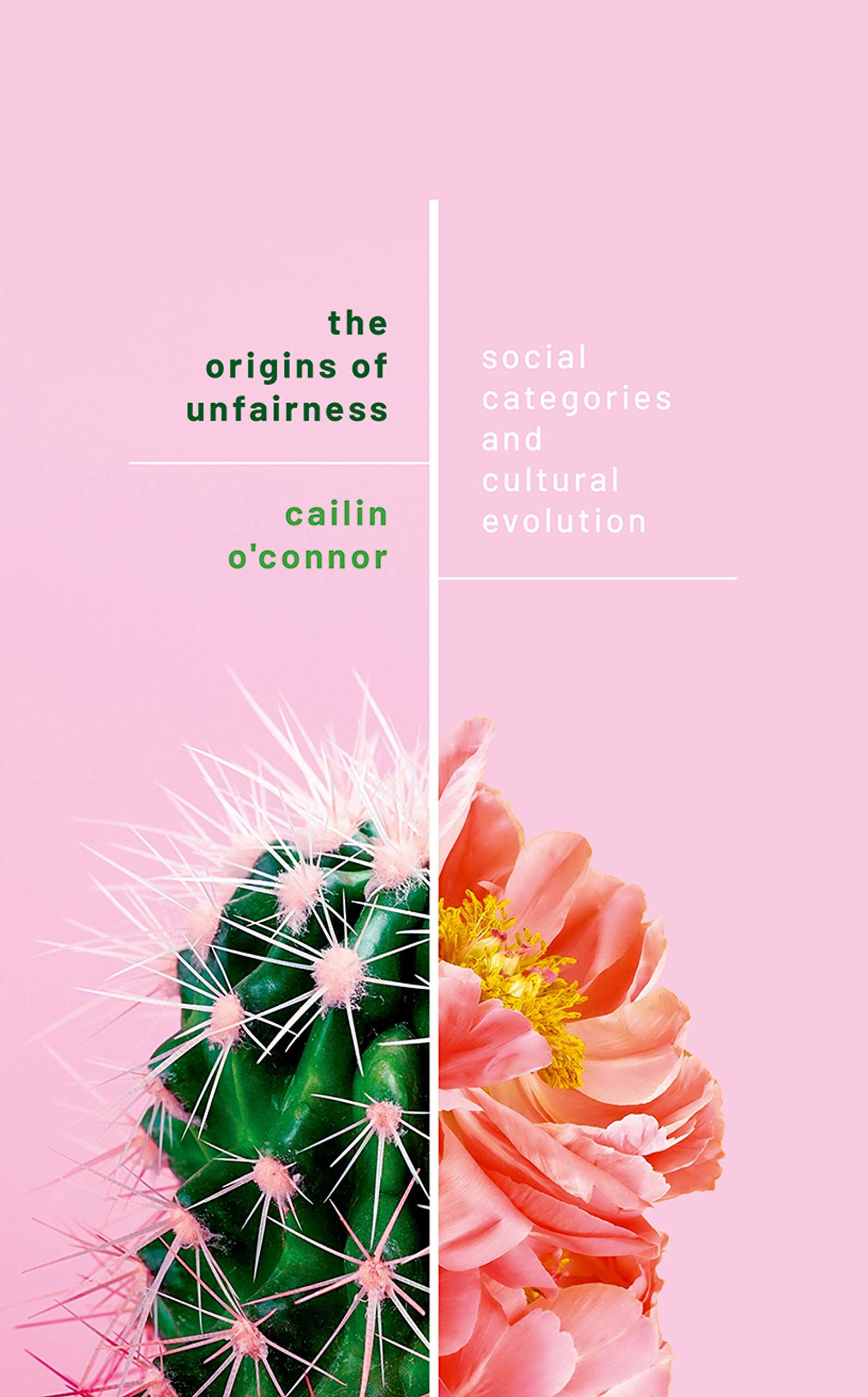
Semester: Fall 2021
Group Leader: Sahar Heydari Fard, Faculty
Inequality and unfairness exist in almost every community. But more often than not, those who usually carry the burden of such inequality and unfairness have seemingly random and often visible features in common. The color of one's skin, gender expressions, or religious symbols are well-known examples of such features.
In The Origins of Unfairness, philosopher Cailin O'Connor explains the relationship between these features and the emergence of unfairness. She uses tools from evolutionary game theory to explain how such features can lead to social norms and conventions that regulate our lives while perpetuating chronic and complex social problems. In other words, her work describes how inequity and unequal bargaining power can emerge from simple interactions among members of a group with gender and racial categories.
The Theory of the Leisure Class
By Thorstein Veblen
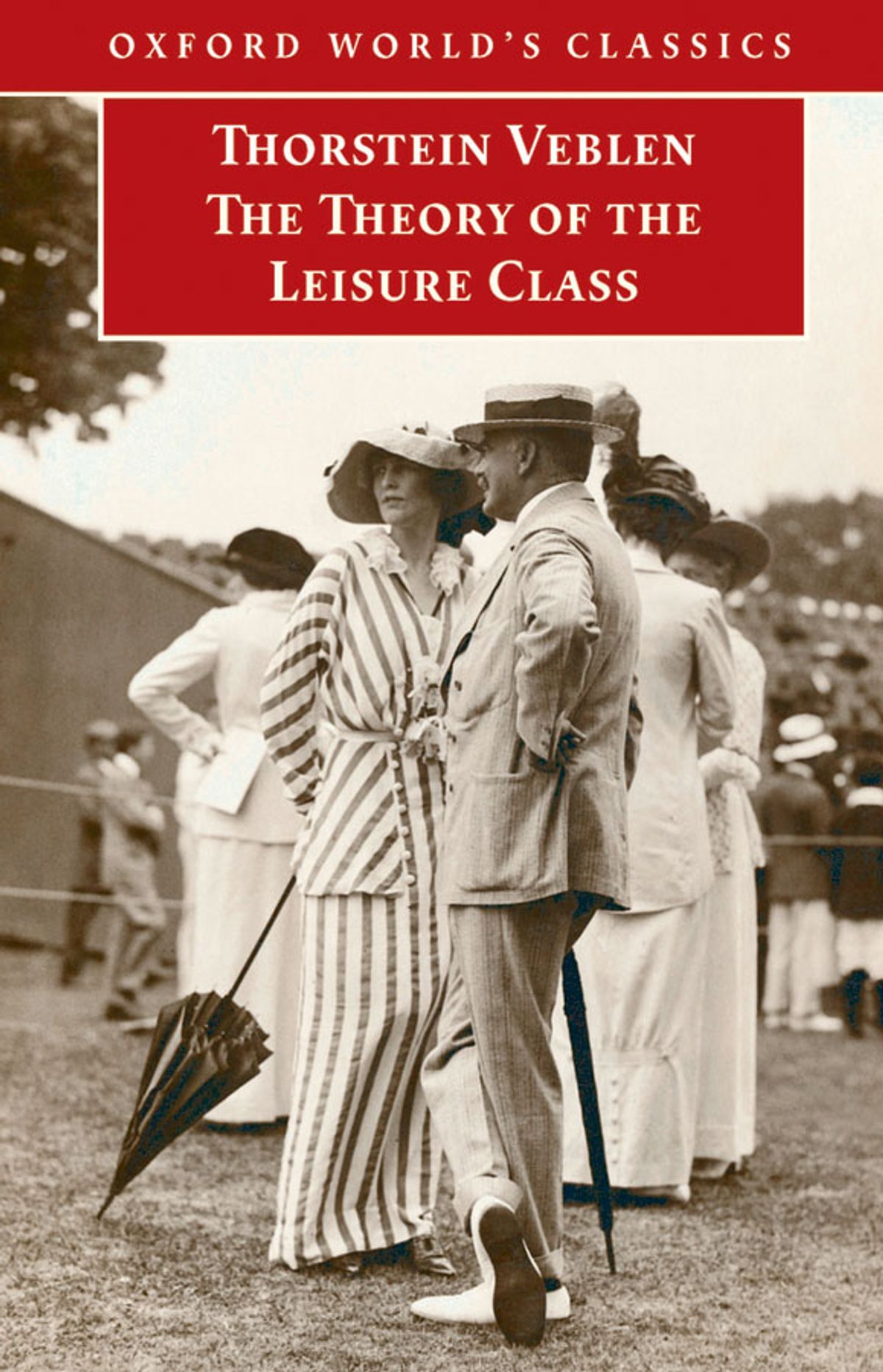
Semester: Fall 2021
Group Leader: Kirun Sankaran, Faculty
Veblen's classic work of social theory provides a simple and plausible general framework for thinking about how society is organized. For Veblen, the idea of status is a fundamental motivator of human action, and status seeking explains a lot of interesting human behavior, as well as features of economic and political organization, like the origins of private property and social class. Veblen was also an incredibly incisive and original social critic, especially of what he saw as the predatory proclivities of the wealthy.
We'll read Veblen's book, along with Joe Heath's lucid article on it from the Oxford Handbook of American Philosophy, and see how its explanations, predictions, and critical resources stack up against its competitors--particularly against Marx. We'll also spend some time trying to figure out how Veblen's central themes of "invidious comparison" and status-seeking feature in his overall social theory, and how status seeking might explain interesting features of our contemporary social and political lives, beyond Veblen's application of them.
Black Skin, White Masks
By Frantz Fanon
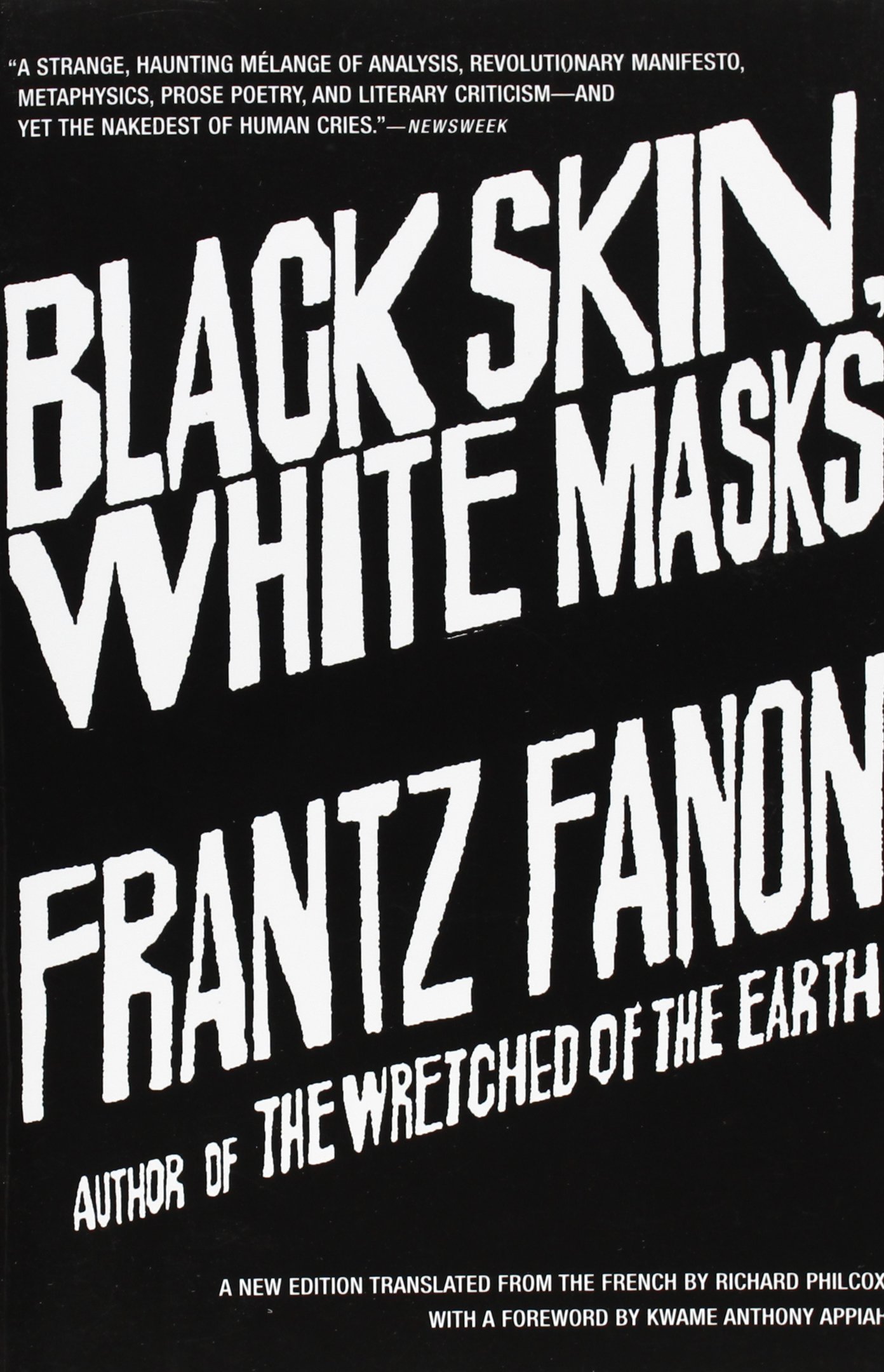
Semester: Spring 2021
Group Leader: DeeAnn Spicer, Affiliated Graduate Student
Frantz Fanon was a leading black intellectual who was born in the Caribbean island of Martinique and later lived in France, Algeria and Tunisia. In this reading group we will explore one of Fanon’s classic works, Black Skin, White Masks, and discuss how its themes relate to our current social context.
In Black Skin, White Masks, Fanon, using his own experience, reflects on the effects that colonialism and racism has had on the lived experiences and minds of both the colonized and the colonizer. The ideas espoused in this book as well as his subsequent book The Wretched of the Earth, influenced various anticolonial movements, the civil rights movement in the American South, the struggles against apartheid in South Africa in addition to the trajectory of anti-racism and postcolonial intellectual movements. We will use Fanon’s psychological, political, and philosophical analysis to examine themes such as language, interracial relationships, the psychological effects of racism, identity, and black consciousness, among other topics.
Discourse on Inequality
By Jean-Jacques Rousseau
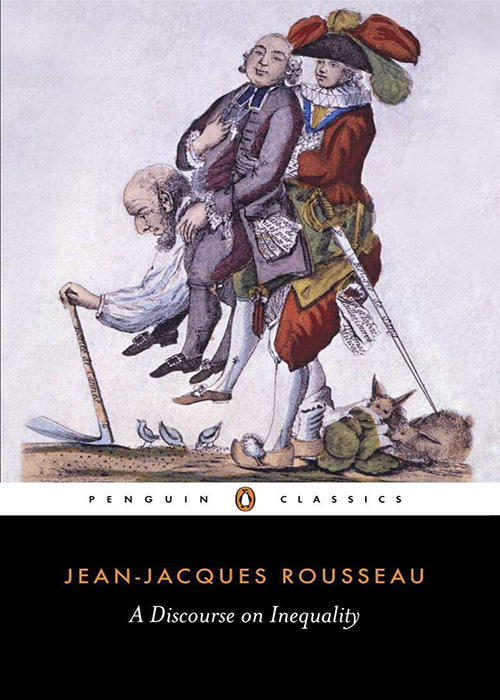
Semester: Spring 2021
Group Leader: Matthew Young, Affiliated Graduate Student
Life in the modern world is characterized by pervasive and persistent inequalities, that are often exacerbated by our use of invasive and addictive (if also incredible useful!) technologies. These problems require detailed analysis: What are the long-term costs of inequality for a society? Is inequality the cost of innovation and merit, or does it corrode our ability to see each other as moral equals? Technological advancements often make our lives easier, but do they help us live well?
In this PPE reading group, we will strive to answer these questions and more as we take a leisurely stroll through 18th century French polymath Jean-Jacques Rousseau’s Discourse on Science and the Arts and Discourse on Inequality. A brilliant diagnostician of the human condition, Rousseau considers the interactions of technology, the modern state, and economic inequality—and the threat that each poses to authentic democracy and true human freedom. We will read these texts through three lenses, as we consider with Rousseau the economic forces that guide technological advancement and produce inequality, the moral and psychological effects of these developments, and the role they play in the genesis and identity of the modern nation-state. Rousseau’s penetrating analysis remains salient today, as we weigh the costs and benefits of inequality and technology in our own society.
The Age of Surveillance Capitalism
By Shoshana Zuboff
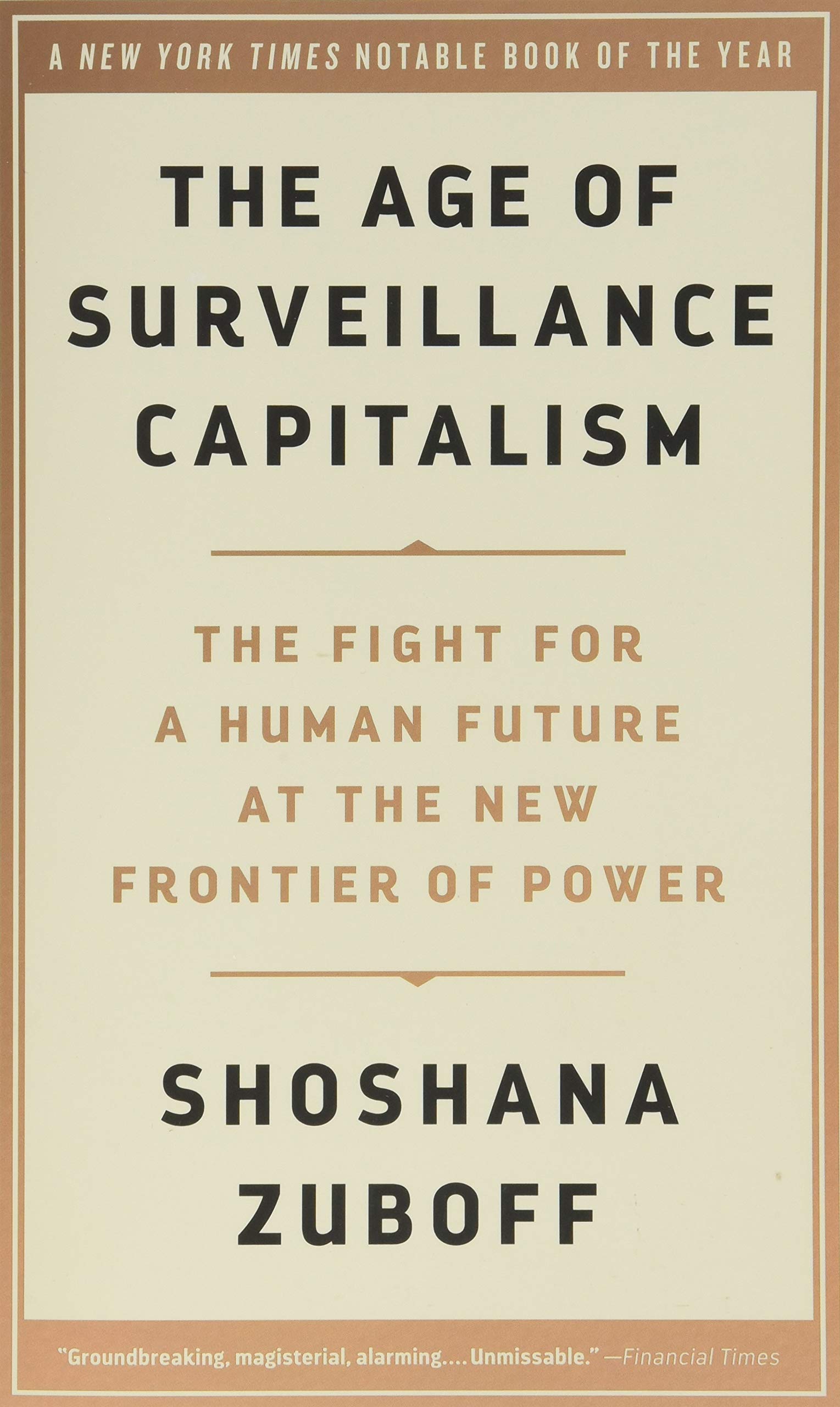
Semester: Spring 2021
Group Leader: Chris Blake-Turner, Affiliated Graduate Student
Digital technologies aren’t just changing marketplaces, but the very fabric of capitalism itself. Not just changing, but have already changed. In The Age of Surveillance Capitalism, Shoshana Zuboff argues that the digital economy has ushered in a new era of capitalism. This has caught most of us unawares, carrying on more or less as we had been previous to this seismic shift in the structure of our society. Zuboff, perhaps better than any other author, shines a light on the digital surroundings that we live in but rarely look at. It is also a call to do something, before it is too late, about the inequalities of knowledge and information that we have let come to pass. Thought provoking and rigorously argued, this book is likely to change the way you see the world.
The Subjection of Women
By John Stuart Mill
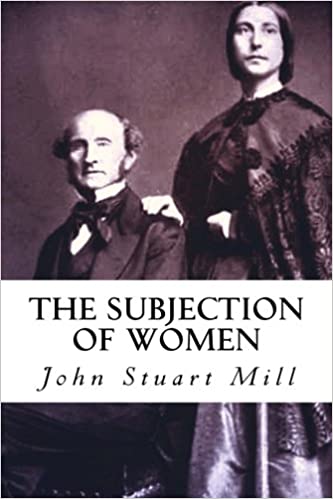
Semester: Spring 2021
Group Leader: Devin Lane, Affiliated Graduate Student
In his famous work, The Subjection of Women, John Stuart Mill opposes the conventional norms of his time to argue for the equality of men and women with respect to a number of issues, including enfranchisement, education, and marriage. His arguments are based on several grounds: the problematic assumptions motivating justifications of inequality, the justice owed to women, and the benefits of equality to society as a whole. This work was ahead of its time, and it remains a central text on the issue of equality to this day. It is a short work, which means that we will be able to work through its key ideas very closely, carefully, and thoroughly.
In our discussions, we will focus on (at least) three aims. Firstly, we will attempt to interpret and reconstruct Mill’s arguments as faithfully as possible, noting their strengths and limitations. Secondly, we will consider how the insights of the work remain applicable to issues of gender inequality that we face today. And thirdly, we will more generally consider what lessons can be learned from this significant attempt to oppose the prevailing moral and political beliefs of one’s contemporaries. My hope is that working through this text will help us gain the skills necessary to identify and critique the injustices of our own time, even if doing so requires deviating from the prevailing views of our society.
Anger and Forgiveness
By Martha Nussbaum
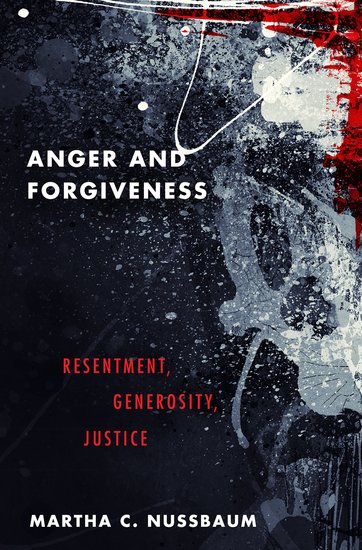
Semester: Fall 2020
Group Leader: Delaney Thull, Affiliated Graduate Student
Martha Nussbaum’s Anger and Forgiveness argues that political anger often takes on a simple retributive character, where the only way for the harmed party to feel restored is to see their oppressor suffer. On her view, political forgiveness often complements this anger, requiring a performance of self-abasement as a condition for public reconciliation. She looks at case studies of anger, from tense workplace relationships, to post-apartheid South Africa, and the American criminal justice system. And she brings the ideas of Ancient Greek Stoic philosophers into conversation with the more recent work of political activists, including King, Mandela, and Ghandi, in order to argue for a vision of civic generosity. In these days of deep political disagreement, readers will benefit from developing a critical understanding of both the danger and the power of anger in politics.
Christ and the Common Life
By Luke Bretherton
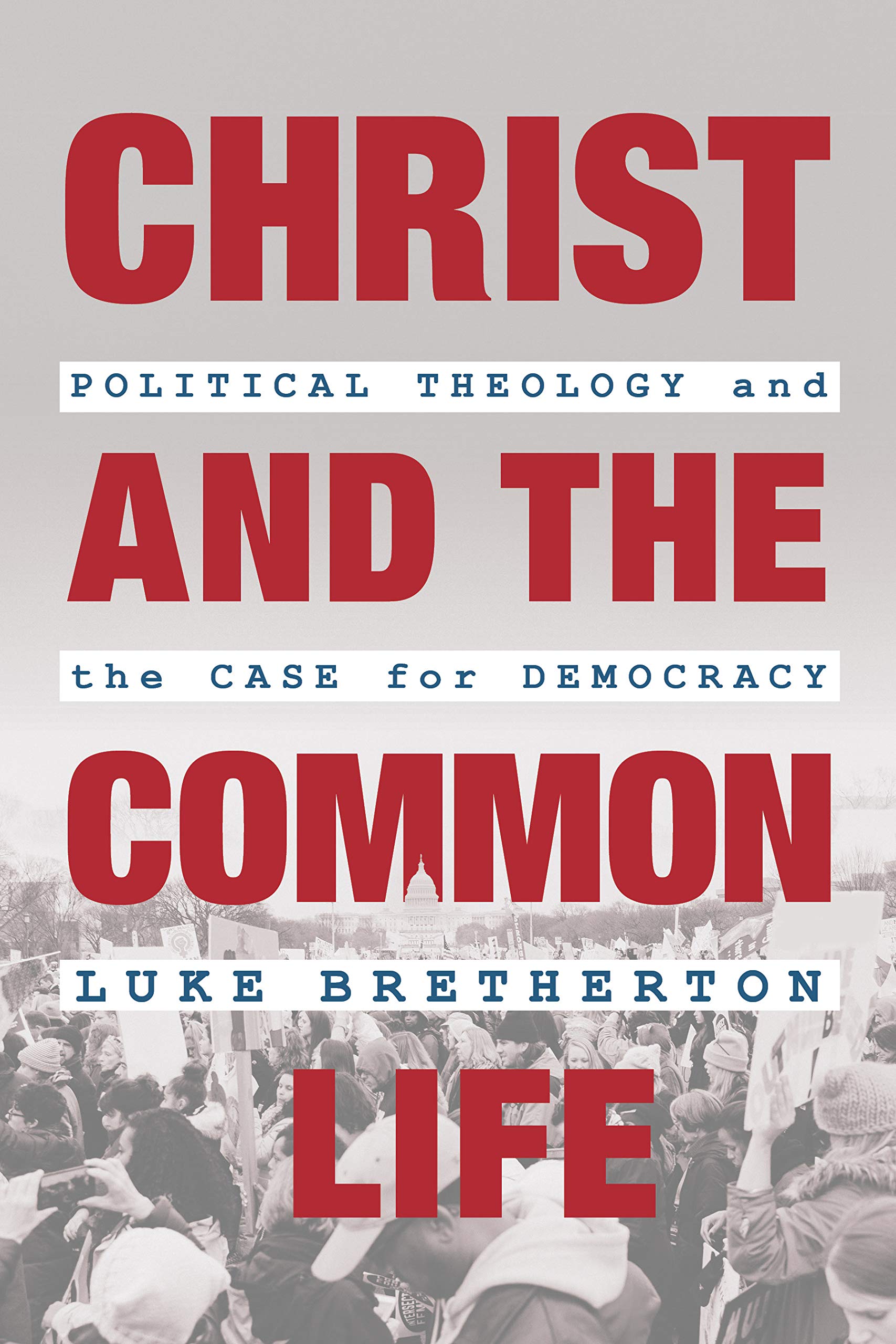
Semester: Fall 2020
Group Leader: Samuel Schmitt, Affiliated Graduate Student
Democracy is in doubt or backsliding all over the world, including the United States. Many are unmoved by impartial, theoretical support of democratic society. Instead of speaking from ‘nowhere’, Luke Bretherton’s Christ and the Common Life (2019) makes an explicitly Christian case in favor of democratic government and the democratic way of life. While the text certainly makes a case for democracy, it is much more than that. Reading and critiquing this book will help us understand the interweaving of economic, political, theological, gendered, and racial conflicts in democratic societies–making the case that Christians ought to be committed to democracy for a number of reasons. The book engages thinkers as diverse as Elinor Ostrom, James Cone, Arendt, Augustine, Hayek, Hobbes, Carl Schmitt, Kant, Marx, and John Paul II. If all that is not enough, Prof. Luke Bretherton (the author) has generously agreed to join one of our last meetings to discuss the text and answer questions. This reading group is sure to be an interdisciplinary feast!
The New Jim Crow: Mass Incarceration in the Age of Color Blindness
By Michelle Alexander
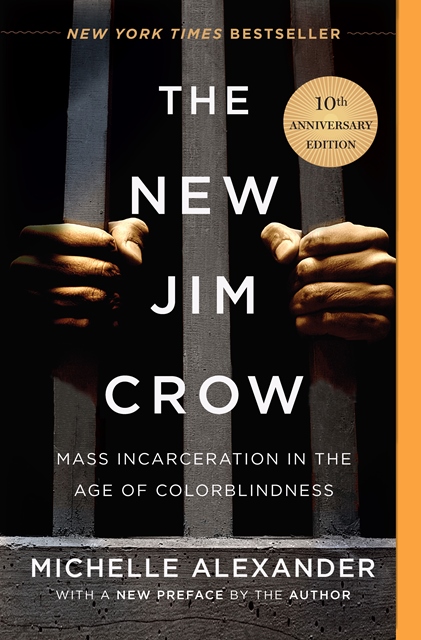
Semester: Fall 2020
Group Leader: Karl Adam, Affiliated Graduate Student
Do you want a place to have thoughtful discussions about the impacts of the American criminal justice system on the black community? Do you want to learn from dialog with other students over what changes would make the criminal justice system and its policies more just and how those changes can be brought about? Then join us to discuss legal scholar Michelle Alexander’s best-selling book, The New Jim Crow: Mass Incarceration in the Age of Colorblindness, which is “One of the most influential books of the last 20 years” (Chronicle of Higher Education) and a must read.
Alexander argues that the criminal justice system, in its current form, functions much like the Jim Crow laws of the past to keep black people in the role of second class citizens. Along the way she addresses such topics as the political forces shaping criminal justice policy; the role and powers of the police; the economic impacts of a criminal record for job seekers; the psychological, economic, and political impacts of mass incarceration on the incarcerated, as well as their families, friends, and communities; and the, in her view mistaken, priorities of civil rights organizations. We will read, analyze, discuss, explore and evaluate Alexander’s arguments so that we can come to a better understanding of the nature of racism in America and be armed with the knowledge and tools to be effective participants in building a better future.
Reflections on the Revolution in France
By Edmund Burke

Semester: Spring 2020
Group Leader: Z Quanbeck, Affiliated Graduate Student
Widely regarded as a foundational text of modern conservatism, Edmund Burke’s classic pamphlet entitled Reflections on the Revolution in France integrates eighteenth-century historical commentary with a discussion of political theory still relevant today. In critiquing the French revolution and the theory of abstract rights that served as the revolution’s philosophical inspiration, Burke articulates a vigorous defense of the value of tradition and the prudence of gradual political change. In this reading group, we will both interpret Burke’s political philosophy within its historical context to better understand this PPE classic, and evaluate whether or how Burke’s ideas ought to inform our contemporary political theory.
Love Your Enemies: How Decent People Can Save America from the Culture of Contempt
By Arthur Brooks

Semester: Spring 2020
Group Leader: Si-Hua Chang, Affiliated Graduate Student
In a time of increasing political and cultural polarization, Arthur Brooks’ Love Your Enemies calls neither for abuse and outrage nor for mushy moderation but for decency, integrity, and honest disagreement.Love Your Enemies brings both contemporary behavioral science and ancient philosophy to bear upon questions not just of civic cooperation but of interpersonal love that transcends differences. Love Your Enemies asks timely questions as the 2020 elections draw near.
Dark Ghettos: Injustice, Dissent, and Reform
By Tommie Shelby
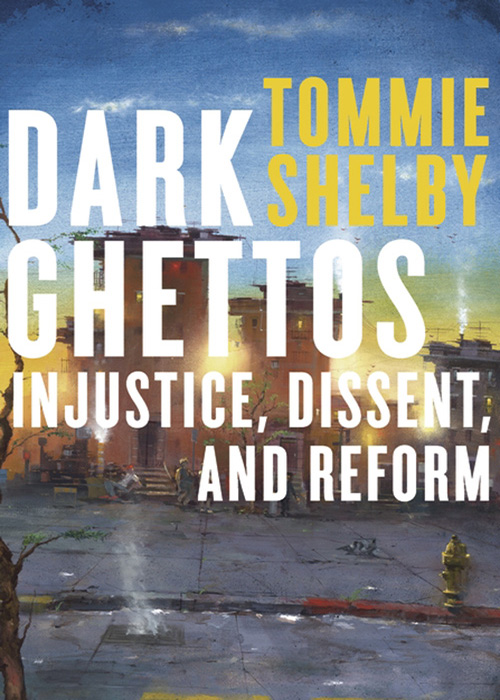
Semester: Spring 2020
Group Leader: Alexandru Marcoci, Faculty
In Dark Ghettos: Injustice, Dissent, and Reform, Tommie Shelby argues for a radical change in the way in which academics and policy makers approach the problem of poor black neighbourhoods in the United States. The received view is that policy makers should isolate one salient and disconcerting feature — joblessness, single motherhood, violent crimes — as the key to solving the problem of ghettos and propose cost-effective policy interventions to address it. Shelby argues such an approach fails on three different levels. First, it takes the underlying injustice that has led to the appearance of ghettos as given and asks the inhabitants of these stigmatized neighbourhoods to integrate in the wider society that marginalized them. Second, by ignoring the structural factors that maintain ghettos, policy makers misunderstand their denizens as passive, irrational, or recalcitrant. Finally, focusing on the disconcerting features of the ghettos hides the illegitimate privileges enjoyed by the advantaged. In this ground-breaking book, Shelby examines questions such as: should single parenthood be avoided or deterred? How should the criminal justice system treat the oppressed? Is intentional unemployment or crime an acceptable mode of dissent? Should the government work to integrate dark ghettos?
Governing the Commons
By Elinor Ostrom
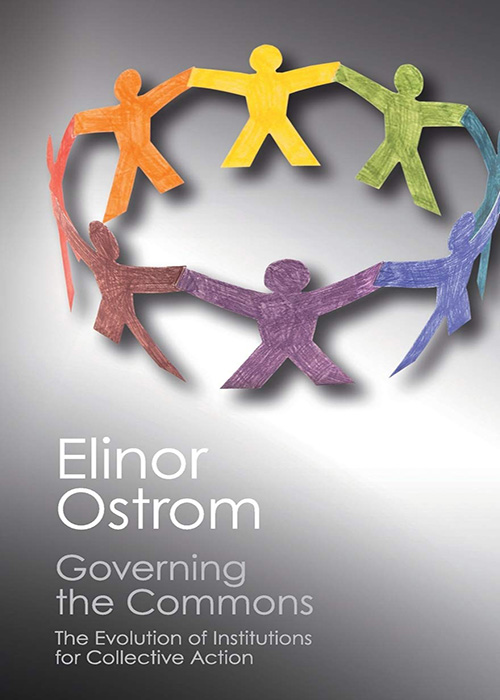
Semester: Spring 2020
Group Leader: Samuel Schmitt, Affiliated Graduate Student
How we care for the environment, how we check government overreach, and how to balance those two sometimes competing aims is of vital importance. Elinor Ostrom’s Governing the Commons (1990) is a modern PPE classic which helps us think more clearly about that complicated subject. Incorporating groundbreaking fieldwork, incisive theoretical invention, and practical findings, Governing the Commons helped Ostrom earn The Sveriges Riksbank Prize in Economic Sciences (the Nobel prize for economists). The text chiefly concerns how agents overcome collective action problems in the context of common-pool resource management (e.g. fisheries, forests, water supply). In this reading group, we’ll ask and discuss what collective action means for us, our communities, our responsibilities, and our environment.
Crises of the Republic
By Hannah Arendt
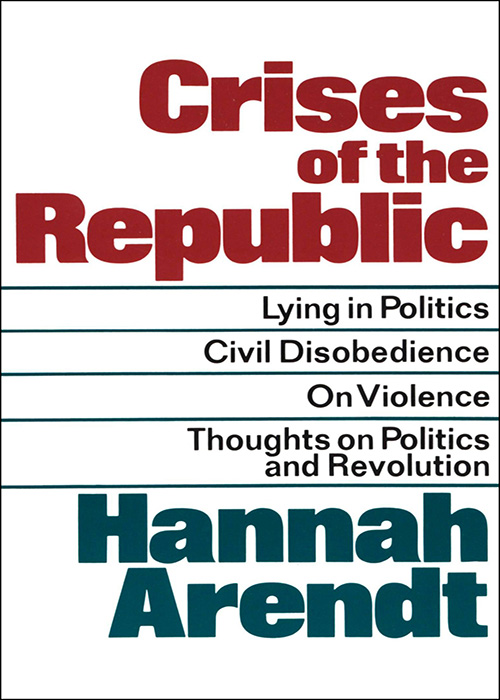
Semester: Fall 2019
Group Leader: Simone Gubler, Faculty
Hannah Arendt was one of the foremost political philosophers of the Twentieth Century. Over the course of her lifetime, she diagnosed and bore witness to the emergence of many new political problems, as well as to the evolution of some old ones. Her philosophical work is characterized by its direct and critical engagement with history. Each of the essays in this volume was composed in response to political events that occurred in the United States, during the 1960s and ‘70s. Nonetheless, as works of civic engagement and political philosophy, the essays in Crises of the Republic remain strikingly contemporary in their concerns.
The collection opens with a meditation on the release of the Pentagon Papers, and with the realization that the American public has been systematically lied to by its leaders. Arendt asks: What role should lying play in politics? After all, “Truthfulness has never been considered among the political virtues, and lies have always been regarded as justifiable tools in political dealings.” So, are some sorts of political lying more nefarious than others? What threats might political lying present to democratic society? And what hope can citizens have of exposing systematic lies?
In the subsequent essays, Arendt moves to address other timely concerns, including the increasing bureaucratization of modern states, the role of civil disobedience in democracy, the relationship between power and authority, and the difficulty of securing democratic life using political strategies that rely on violence and coercion.
The Social Contract
By Jean-Jacques Rousseau
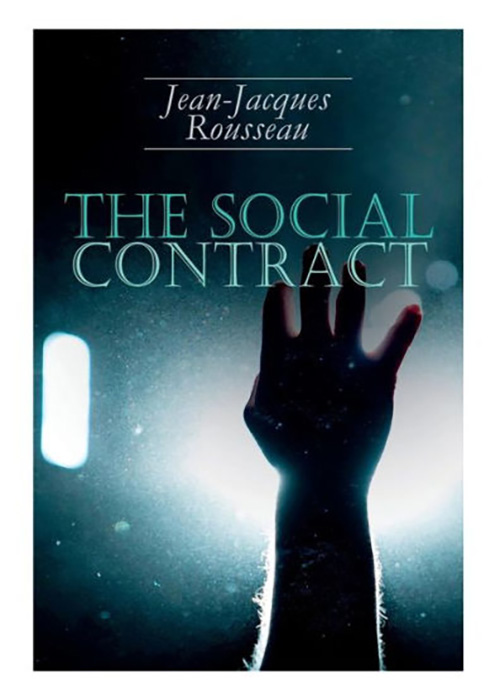
Semester: Fall 2019
Group Leader: Ryan Doody, Faculty
Rousseau’s oft-quoted line “Man is born free and everywhere he is in chains” pithily expresses one of political philosophy’s most enduring problems. In forming a political community, we each give up some of our individual freedom. Freedom is paramount. Can there be any kind of legitimate political authority? Is it possible for us to live together and remain free? In The Social Contract, Rousseau argues that we can and outlines how it could be done. The secret involves a particularly strong form of direct democracy, the general will, and personal transformation. The treatise, published in 1762, inspired revolutions throughout Europe as well as influenced Thomas Jefferson’s writing of the Declaration of Independence. The work continues to inspire to this day.
A Vindication of the Rights of Woman
By Mary Wollstonecraft
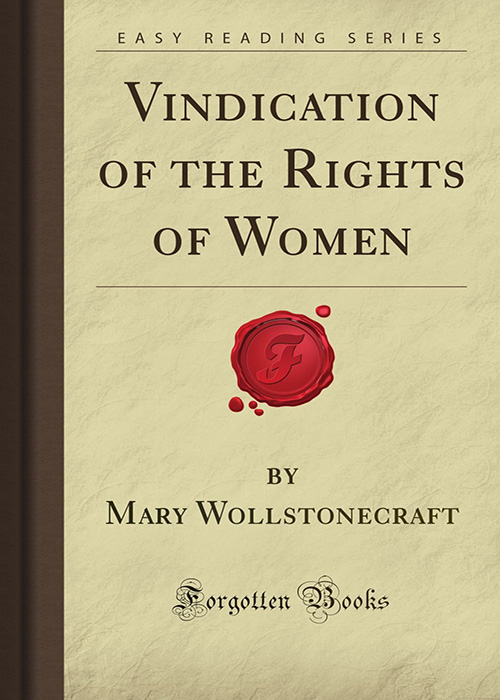
Semester: Spring 2019
Group Leader: Audra Jenson, Affiliated Graduate Student
Mary Wollstonecraft’s A Vindication of the Rights of Woman presented one of the first arguments that women’s rights are human rights. She argued that girls should be educated and that women should work outside the home and contribute to politics. But while she’s famous for her very early contributions to feminist philosophy, A Vindication of the Rights of Woman, published in the 18th century, was ground-breaking in many ways and is multiply still relevant today. She called for equal education for both boys and girls. She argued that that education should be free and public and that it should be available to everyone regardless of how wealthy their families were. She even discussed the ever-present nurture versus nature debate. In this reading group we’ll read the entirety of A Vindication of the Rights of Woman and discuss both the historical context and the ways in which Wollstonecraft’s arguments are still relevant today.
The Cost-Benefit Revolution
By Cass Sunstein
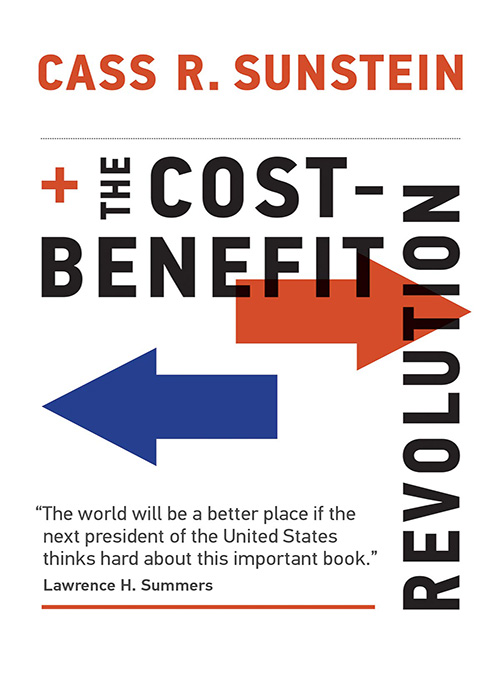
Semester: Spring 2019
Group Leader: Nevin Johnson, Affiliated Graduate Student
Cass Sunstein’s The Cost-Benefit Revolution (2018) provides a historical overview of, and a justification for, the use of cost-benefit analysis in creating policy. Sunstein argues “government policy should not be based on public opinion, intuitions, or pressure from interest groups, but on numbers—meaning careful consideration of costs and benefits.” Quantitative cost-benefit analysis provides the best way to “make people’s lives better” while preserving autonomy. Sunstein does not argue all laws and policies should be determined by cost-benefit analysis, as such analysis might be subject to rights-based limitations. The Cost-Benefit Revolution also includes discussions of particular issues, like the role of courts, mandatory labels, national security, personal privacy, and freedom of speech.
Thinking, Fast and Slow
By Daniel Kahneman
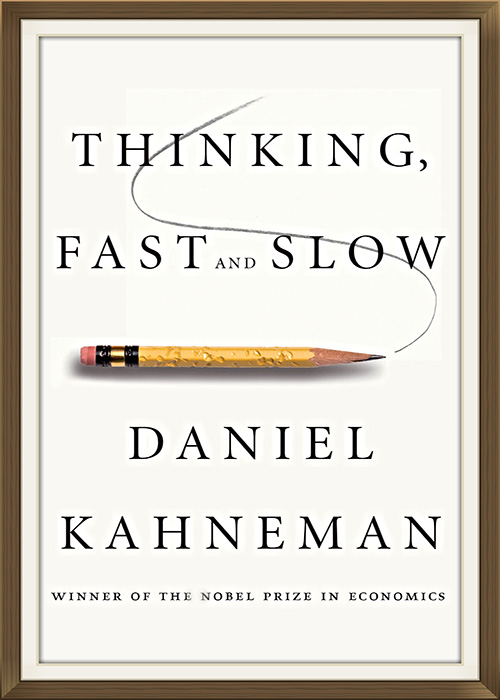
Semester: Spring 2019
Group Leader: Dominik Berger, Affiliated Graduate Student
In the international bestseller, Thinking, Fast and Slow, Daniel Kahneman, renowned psychologist and winner of the Nobel Prize in Economics, takes us on a groundbreaking tour of the mind and explains the two systems that drive the way we think. System 1 is fast, intuitive, and emotional; System 2 is slower, more deliberative, and more logical. The impact of overconfidence on corporate strategies, the difficulties of predicting what will make us happy in the future, and the profound effect of cognitive biases on everything (from playing the stock market to planning our next vacation) can all be understood only by knowing how the two systems shape our judgments and decisions.
Engaging the reader in a lively conversation about how we think, Kahneman reveals where we can and cannot trust our intuitions and how we can tap into the benefits of slow thinking. He offers practical and enlightening insights into how choices are made in both our business and our personal lives―and how we can use different techniques to guard against the mental glitches that often get us into trouble.
Democracy in America
By Alexis de Tocqueville
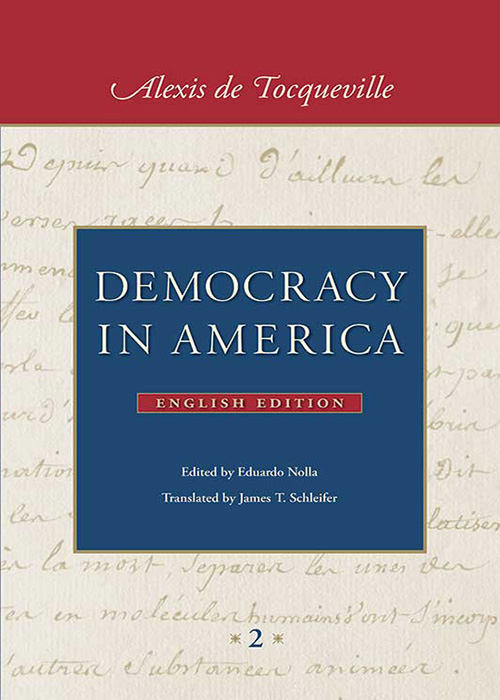
Semester: Spring 2019
Group Leader: Francesco Nappo, Affiliated Graduate Student
A classic of XIX century political philosophy, Democracy in America is the result of a long journey and an attentive study of America’s democratic experience by French political scientist and historian Alexis de Tocqueville. In this reading group, we will examine de Tocqueville’s reflections on the mechanisms and failures of democracy and compare his observations on early nineteenth century America’s legislation and social structure with today’s. Along the way, we will discuss de Tocqueville’s ideas regarding the influence of democracy on the shaping of political institutions, popular culture, religion, norms and customs. We will also consider de Tocqueville’s concerns for the future of the democratic experience of the United States, touching upon issues of inequality, the preoccupation for material well-being, and the risks of political corruption and oligarchy. Democracy in America is an essential text for understanding the past, present and future of democracy in the United States.
Down Girl: The Logic of Misogyny
By Kate Manne
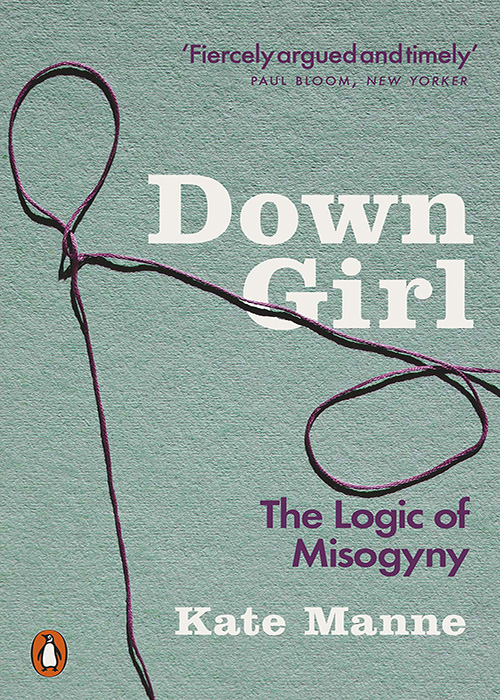
Semester: Fall 2018
Group Leader: Minji Jang, Affiliated Graduate Student
In her Amazon bestseller, Kate Manne aims to construct a functional account of misogyny. Manne rejects the naive conception of misogyny understood as hatred toward women qua women, which makes the phenomenon appear as virtually nonexistent and politically marginal. Instead, she suggests that we view it as a property of social environments, which serves to preserve and enforce the patriarchal order by punishing, policing and deterring women who are challenging the norms of male dominance and female subordination. Misogyny, understood this way, is pervasive and deeply entrenched in major aspects of our social lives.
Having constructed this account, Manne moves on to examine misogyny featured in a series of current events, such as the Isla Vista killings by Elliot Rodger, the case of serial rapist Daniel Holtzclaw, the misogyny speech by the Prime Minister of Australia Julia Gillard, and the 2016 U.S. presidential election where Hillary Clinton was defeated by Donald Trump. This book attempts to demystify the much-debated, yet hard-to-boil-down phenomena of misogyny and sexism in moral and political dimensions of our lives and will prompt interesting and important discussions.
Basic Income: A Radical Proposal for a Free Society and a Sane Economy
By Philippe Van Parijs and Yannick Vanderborght
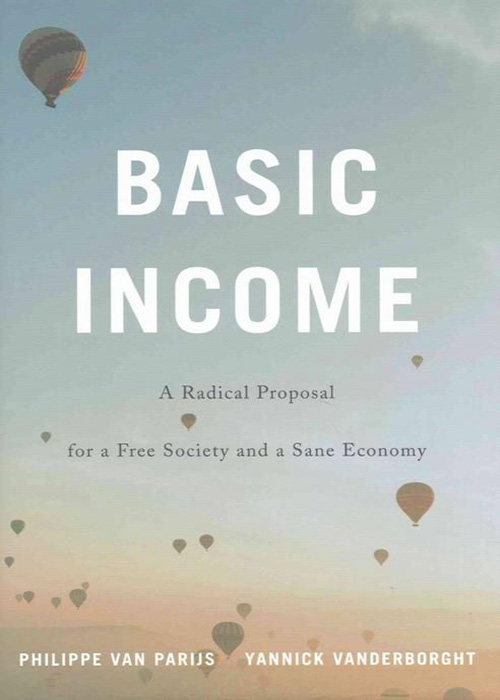
Semester: Fall 2018
Group Leader: Michael Prinzing, Affiliated Graduate Student
The idea of a universal basic income has recently received a great deal of attention in popular culture. A basic income program would involve a government giving regular, unconditional cash payments to each of its citizens, thus ensuring that everyone has an income above the poverty line. This proposal has attracted support from a remarkable range of people, with otherwise very different political orientations. Prominent supporters of basic income include: Thomas Paine, Friedrich Hayek, Martin Luther King Jr., Milton Friedman, Mark Zuckerberg, and Elon Musk. Some advocate a basic income as a means to securing individual liberty, or social equality. Some recommend it as a far simpler (and perhaps even cheaper) replacement for current welfare programs. Others think that the rise of artificial intelligence will eliminate so many jobs that a basic income will become a practical necessity. In this reading group, we’ll think seriously about this intriguing idea by reading and discussing a new book, Basic Income, by Philippe Van Parijs and Yannick Vanderborght. We’ll cover: ethical/political arguments for and against basic income programs; the costs of such programs; how they might be sustainably funded; and their real-world political achievability. We’ll also get to look at some of empirical evidence from basic income pilot programs—many of which are going on now.
The Theory of Moral Sentiments
By Adam Smith
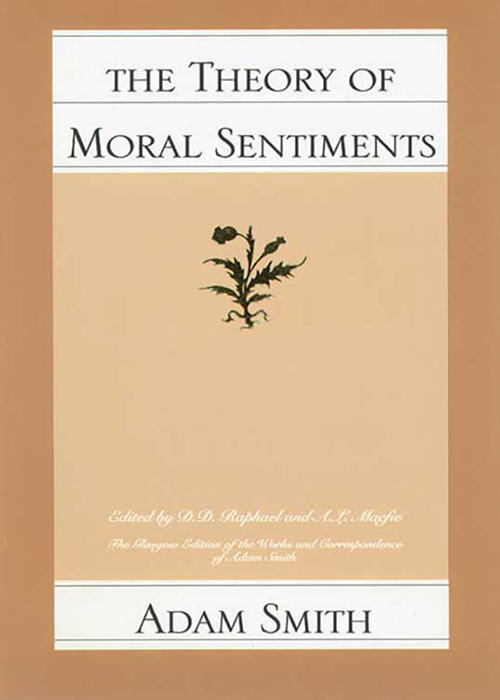
Semester: Fall 2018
Group Leader: Ian Cruise, Affiliated Graduate Student
Adam Smith is one of the most important thinkers of all time. His masterpiece, The Wealth of Nations, is one of the foundational texts of modern economic thought. But Smith was more than an economist. He is also one of the most important moral philosophers of the 18th century. His central contribution to moral philosophy, The Theory of Moral Sentiments, is the text that we will study in this reading group. It serves as both a fascinating contribution to moral philosophy, with its original insights into the nature of sympathy, justice, and beneficence (among other topics), and the essential moral background against which his economic writings ought to be read. In short, it is one of the most important books in the PPE canon.
Two Treatises Concerning Government & A Letter Concerning Toleration
By John Locke
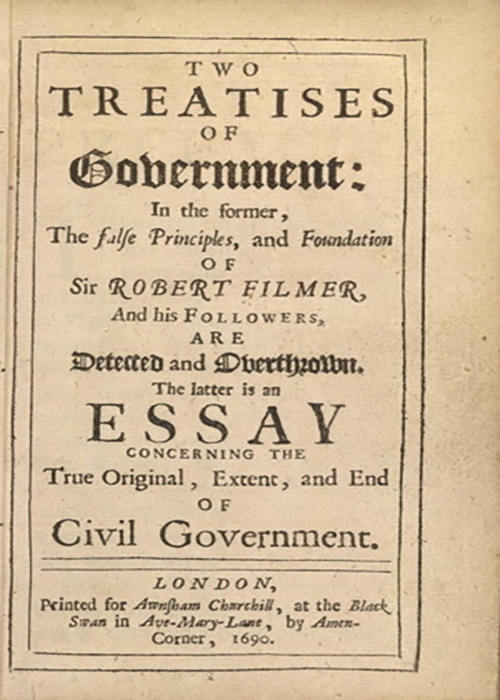
Semester: Fall 2018
Group Leader: Eric Sampson, Affiliated Graduate Student
Read the first two paragraphs of The Declaration of Independence and you’ll want to start a revolution right then and there. The ideas expressed there are so simple and yet so powerful. Where’d they come from? Answer: largely, John Locke’s Second Treatise of Government—one of the most influential political treatises ever written. In it, Locke argues that human beings have natural rights that exist independently of any state’s say-so. These rights set the limits on what a government may permissibly do to, or for, its citizens. On Locke’s view, citizens give the state authority to use force, but only in the service of protecting their rights. The state and its citizens are thus engaged in a contractual relationship. If the state fails to hold up its rights-protecting end of the deal, revolution is permitted, and perhaps even required. Seems like John Locke is into conflict and violence, right? Wrong. In A Letter Concerning Toleration, Locke calls for the separation of Church and State and a general attitude of toleration toward those with different religious views. The arguments for such an attitude toward religious views easily extends to an attitude of toleration toward those with different political views, too—an attitude desperately needed in our time. A common theme in each of these works is opposition to the (over-)use of force by powerful institutions. So, ordinarily I’d say, “Join this reading group or die!” but I’ve read my Locke, so I’ll just say, “Hey, join this group if you’d like.”
The Road to Serfdom
By Friedrich von Hayek
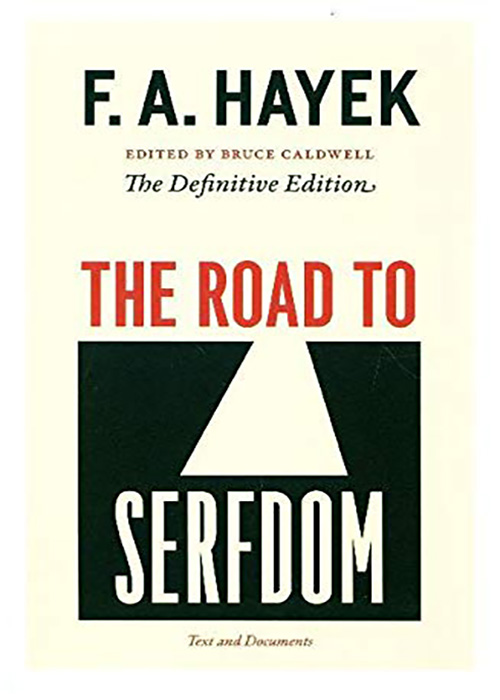
Semester: Spring 2018
Group Leader: Dan Kokotajlo, Affiliated Graduate Student
The political right often maligns the left by pointing out that Nazi is a shortening of “National Socialist,” while the left retorts that the Nazis were very definitely a right-wing phenomenon. The Road to Serfdom is an account of what really happened in Germany between the world wars. Written by the renowned Austrian economist F.A. Hayek in the middle of World War II, it argues that planned economies are the road to serfdom. It shows that in a variety of ways, when governments take more control over the economy, this creates the conditions for totalitarianism to arise—whether in a leftist regime (Russia) or a right-wing regime (Germany). Hayek’s arguments have since been championed by libertarians in the US, but Hayek was a classical liberal: John Maynard Keynes read this book and loved it; the editor of the book was a socialist himself. Moreover, the book was originally written to Hayek’s fellow economists in London who identified as socialists, though it has been embraced by the general public. Hayek was genuinely trying to persuade people who liked planned economies to be more cautious. We shall read his book, discuss his arguments, and determine to what extent we, too, are convinced.
The Federalist Papers
By Alexander Hamilton et al.
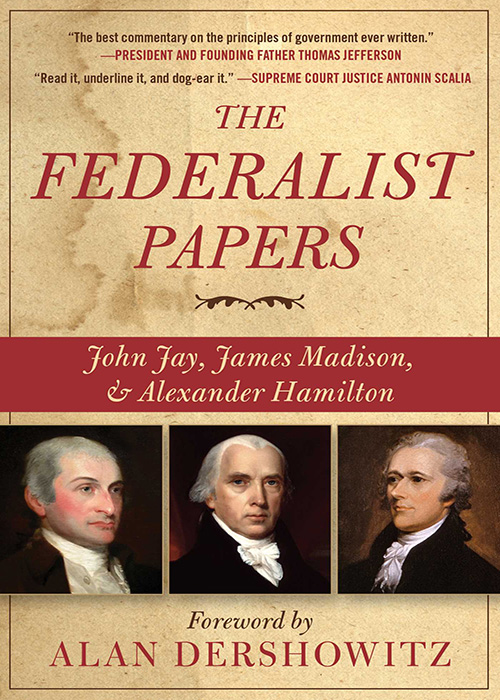
Semester: Spring 2018
Group Leader: Karl Adam, Affiliated Graduate Student
The Federalist Papers, a series of 85 short essays written to convince the skeptical population of New York to ratify the U.S. Constitution, have been called the greatest American contribution to political philosophy. They are essential reading for anyone interested in such topics as the legitimacy of anti-majoritarian institutions like the Electoral college, the Senate, and the Supreme court; the proper roles of the federal government and the states; how best to protect against foreign aggression, domestic tyranny, and civil conflict; and, in short, issues of institutional design. In this reading group, we will read the Federalist Papers in their entirety and use them to better understand, and evaluate, our political institutions.
Discourse on Inequality
By Jean-Jacques Rousseau

Semester: Spring 2018
Group Leader: Alexandra Oprea, Faculty
What are the historical and conceptual origins of inequality? Which inequalities are morally justified and which are not? In 1754, the Academy of Dijon posed these questions in a public essay contest. Rousseau’s entry was the (in)famous Discourse on the Origin and Foundations of Inequality Among Men. This short, elegant, and provocative response has been incredibly influential in the history of philosophy, politics, and economics. Adam Smith published a review of the book. Immanuel Kant kept a bust of the author in his study. Its political ideas were violently recited by Robespierre and other leaders of the French Revolution. Its critique of private property became a precursor for Karl Marx and later socialist thinkers. Our reading group will explore Rousseau’s wide-ranging critique of inequality, taking seriously the claims he makes about evolutionary anthropology, political economy, moral psychology, and political philosophy. We will also ourselves engage with the two driving questions at the core of the book – questions that continue to puzzle and inspire philosophers, political scientists, and economists today.
Nudge
By Richard Thaler and Cass Sunstein
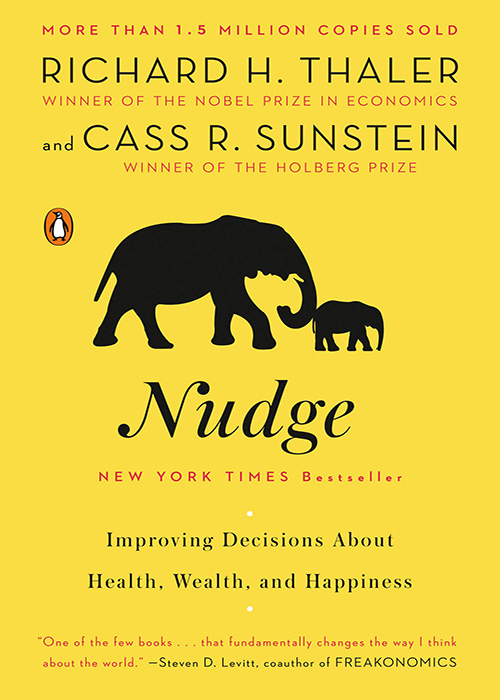
Semester: Spring 2018
Group Leader: Miriam Johnson, Affiliated Graduate Student
Historically, economists have assumed our economic decisions reflect a basic strategy to satisfy (as effectively as we can) our overall desires and preferences. Under this model, we might sacrifice one thing to better accommodate another thing we value more highly. The growing field of “behavioral economics” is proving this model mistaken. As it turns out, our decisions are frequently, and in surprising ways, influenced by factors we ourselves would consider irrelevant or arbitrary. Richard Thaler (a 2017 recipient of the Nobel Prize for his work in behavioral economics) and Cass Sunstein (whose work has influenced White House policymakers) argue that our model of decision-making—and our public policy—should reflect these realities. In this reading group, we will be reading Thaler and Sunstein’s Nudge, which both serves as an introduction to behavioral economics, and defends a specific thesis about a new theory of decision-making ought to impact our policymaking. Participants in this group will get the chance to familiarize themselves with this highly influential and fast-growing area of research, as well as to better understand the hidden influences behind their own everyday decisions. As a special bonus, members of this group will also have the opportunity to prepare questions for Professor Sunstein, who will be giving a talk at UNC this Spring.
The Wealth of Nations
By Adam Smith
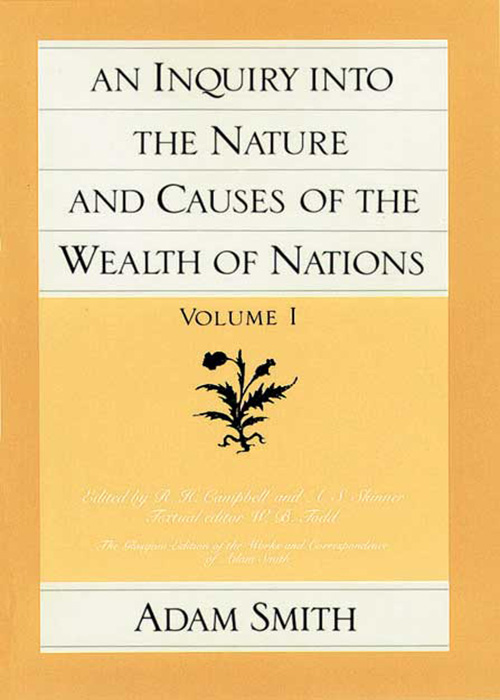
Semester: Fall 2017
Group Leader: Chris Blake-Turner, Affiliated Graduate Student
The Wealth of Nations is one of most influential books ever written. As well as being a foundational text of economic theory, it engages with important issues both in moral philosophy and politics. Despite its importance, however, Smith’s Wealth of Nations is not widely read. In this reading group, we will become familiar with the content of Smith’s economic and philosophical theories as presented in this key text—a must not only for any serious student of PPE, but also for anyone interested in understanding the modern world.
The Righteous Mind: Why Good People are Divided by Politics and Religion
By Jonathan Haidt
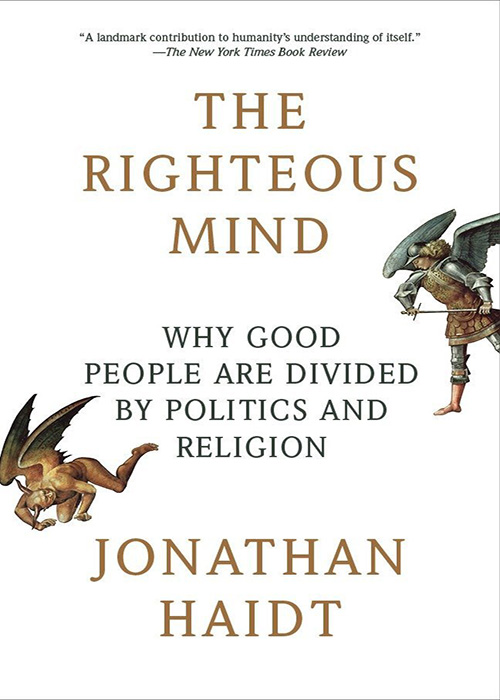
Semester: Fall 2017
Group Leader: Yoaav Isaacs, Faculty
What do liberals, conservatives, and libertarians have in common––and what divides them? Political debates are full of emotionally-charged moral judgments that emerge quickly but that are difficult to justify. In The Righteous Mind Jonathan Haidt makes the provocative claims that ‘our moral thinking is much more like a politician searching for votes than a scientist searching for truth’; that different political parties emphasize different aspects of a common ‘moral palate’; and that a propensity to embrace divisive religious claims is part of an adaptive set of dispositions that helped our ancestors survive and reproduce in small communities. What should we to make of these claims? Does this evidence undermine our judgments about politics and religion? We’ll ask these and many other questions while exploring Haidt’s answers.
Dark Ghettos: Injustice, Dissent, and Reform
By Tommie Shelby

Semester: Fall 2017
Group Leader: Macy Salzberger, Affiliated Graduate Student
What does it mean to help the ghetto poor? How should we do it? Despite a handful of public policy efforts, poor, black neighborhoods- or “dark” ghettos- persist in the United States. Scholars are often concerned with how to ameliorate the conditions of the neighborhoods by identifying some factor, such as single motherhood, joblessness, or violent crime, and then trying to “fix” that factor. In his new book Dark Ghettos: Injustice, Dissent, and Reform, Tommie Shelby takes a different tack by looking at how to best think philosophically about these neighborhoods and residents. He argues that by looking at a framework of principles of justice, we can better understand how the creation and persistence of ghetto poverty have resulted from systematic injustice. Only with such an understanding can we make progress toward answering such questions as, what makes ghetto poverty different from other forms of poverty? What interventions by the state are justified in ameliorating the conditions of dark ghettos? Should integrated neighborhoods be fostered? Should single parenthood be avoided or deterred? What are the unjustly disadvantaged required or permitted to do in response to their unjust conditions? Is crime an acceptable mode of dissent? How should the criminal justice system take unjust conditions into consideration? Through the course of our reading group, our aim will be to develop an understanding of the principles of justices Shelby proposes and his answers to these questions, as well as to critically evaluate and engage with his proposal and answers.
Distributive Justice: Selected Readings
By John Rawls and Robert Nozick
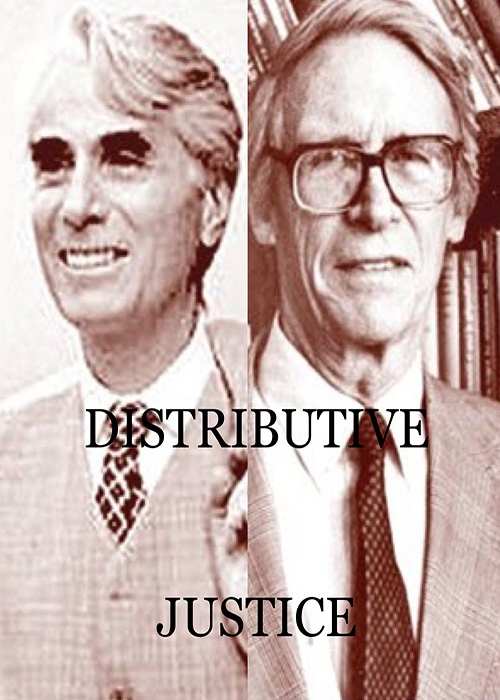
Semester: Spring 2017
Group Leader: Alex Campbell, Affiliated Graduate Student
Distributive justice obtains in a society when its political and economic institutions are set up so that social and economic benefits and burdens are fairly distributed. In this reading group, we consider two incredibly influential, but deeply different, theories of distributive justice. We begin with John Rawls’ defense of liberal egalitarianism espoused in his seminal work A Theory of Justice. We will then turn to Robert Nozick’s libertarian critique of Rawls’ theory and the pursuit of distributive patterns more generally, as defended in his Anarchy, State, and Utopia. Neither is the last word on distributive justice, but taken together they work to frame contemporary discussions of justice even among those who reject their views.
Why Nations Fail: The Origins of Power, Prosperity, and Poverty
By Daron Acemoglu and James A. Robinson
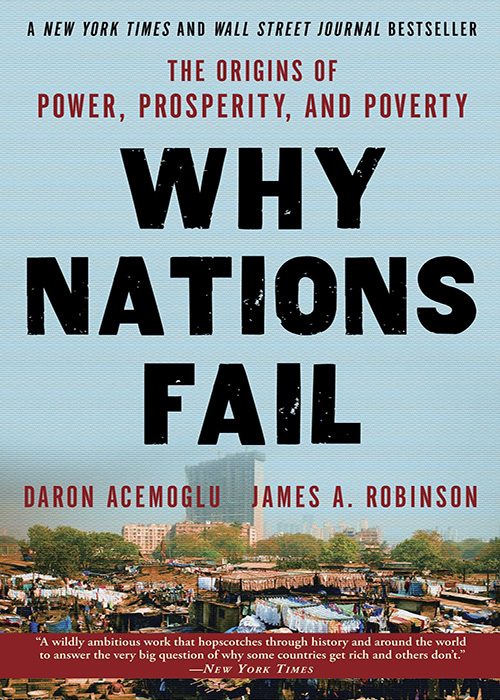
Semester: Spring 2017
Group Leader: Geetha Vaidyanathan, Faculty
Why are there large differences in income levels, education levels and health outcomes across countries? What causes some countries to grow faster than others in the world? What determines prosperity or poverty? Why is Nogales, Arizona in the U.S. better than Nogales, Sonora in Mexico even though Nogales is a single city spread across two countries? North and South Korea are in the same geographical region and have homogenous populations but have vast differences in their income levels. Why? Similarly there are major differences in income levels among Sub-Saharan African countries. Botswana and Swaziland have grown rapidly in recent years when compared to some of the other countries such as Mali and Niger. “Why Nations Fail” is an attempt by two influential researchers, Acemoglu and Robinson, who have very carefully used historical evidence dating back to the Roman Empire, the Mayan City-states, the Soviet Union, the United States, and Africa, to try to define a new theory of political economy to explain the likely causes of differences across nations. You will find this influential book useful to answer the following questions:
Why are some countries trapped in poverty?
To what extent can political and economic institutions determine economic growth in the poorest countries?
Will China’s economic growth make it a superpower overwhelming the West?
Are America’s best days over? Is American creating a growth cycle that enriches and empowers a small minority thus increasing income inequality?
Impact: How Law Affects Behavior
By Lawrence Friedman

Semester: Spring 2017
Group Leader: Kevin McGuire, Faculty
Does the law affect our decisions about how to live our lives? The answer is not as straightforward as it seems. Drawing from evidence provided by a variety of disciplines — sociology, psychology, economics, and political science, among others — Lawrence Friedman shows that law has a good many unexpected consequences. Our knowledge of the law, it turns out, is quite limited, and much of it is plain wrong, and consequently all kinds of people (e.g., doctors, taxpayers, drivers, drug dealers, murderers, government employees, filmmakers, investors, pregnant women, married persons, to name a few) respond in ways that are unintended by lawmakers. Even when we do follow the law, the reasons are often complicated; carrots and sticks can combine with social pressures and our own consciences to affect when and how the law guides are actions. This reading group will introduce you to a rich and fascinating set of research on the role of law in society.
Moral and Political Philosophy: Selected Readings
By John Stuart Mill

Semester: Fall 2016
Group Leader: Ian Cruise, Affiliated Graduate Student
In this reading group, we will read selections from three works by John Stuart Mill: Utilitarianism, On Liberty, and The Subjection of Women. Mill is, by all accounts, one of the central figures in the history of moral and political philosophy. His work has had profound impacts not only on moral and political thinking, but also on economics and public policy. Utilitarianism is Mill’s classic defense of the moral theory of the same name. On Liberty is one of the great works of political philosophy and stands to this day as one of the best defenses of political liberalism ever written. The Subjection of Women is one of the first published defenses of the rights of women and remains one of the great works in feminist philosophy. One advantage of reading selections from each of these great works is that it gives us a chance to try to understand how Mill’s thought coheres. So not only will we study each work individually (a worthwhile endeavor in itself), but we will also try to understand better the unity of the thought of one of the great philosophers of all time.
Democracy in America
By Alexis de Tocqueville

Semester: Fall 2016
Group Leader: Yoaav Isaacs, Faculty
Alexis de Tocqueville’s Democracy in America is one of the finest books ever written about political life. The central task of the book is an investigation of why democracy flourished in America despite having faltered in numerous other nations (including de Tocqueville’s native France). What effects did America’s distinctive qualities have on its democracy, and what effects did America’s democracy have on its distinctive qualities? De Tocqueville offers profound insights into early nineteenth century American democracy––some of which vividly apply to early twenty-first century American democracy and some of which vividly fail to apply to early twenty-first century American democracy. Democracy in America would be well worth reading even if it were (as some classic texts are) a plodding and unpleasant read. Happily, de Tocqueville has a profoundly elegant command of language, and his work is a thoroughgoing pleasure.
Education and Equality
By Danielle Allen
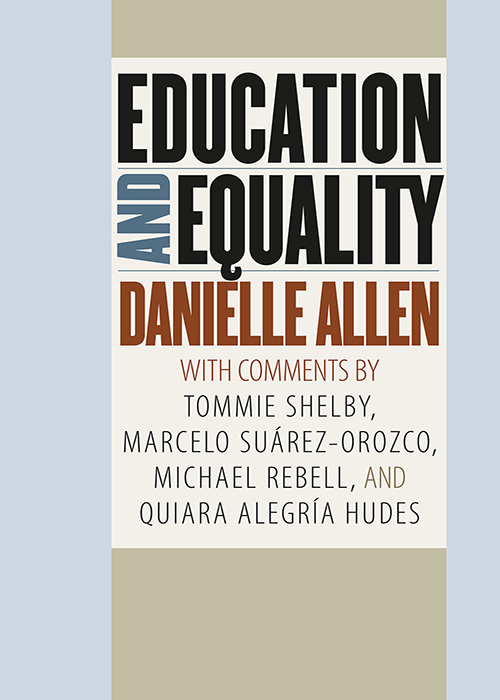
Semester: Fall 2016
Group Leader: Macy Salzberger, Affiliated Graduate Student
Should the primary purpose of education be providing students with the basic competencies needed to be good workers? Should education equalize economic opportunity? What role ought the humanities play in public education? Should education teach students political values? To investigate these questions, we will be reading Danielle Allen’s book Education and Equality. In her book, Allen draws on thinkers from Plato to Rawls to argue that education ought to reorient itself toward participatory readiness in democratic society rather than vocational preparation. Through our reading, we will critically engage with and respond to Allen’s arguments and the commentaries from contemporary theorists included in her book. We will also consider the implications of the arguments for policy and practice in education, including our own aims in pursuing higher education.
The Federalist Papers
By Alexander Hamilton, et al.

Semester: Fall 2016
Group Leader: Amy Berg, Faculty
Maybe you’ve seen Hamilton or you’re obsessed with the soundtrack, or maybe you’re just curious what all the fuss is about. What better way to understand the man behind the musical than to read the Federalist Papers? These short essays–written by Alexander Hamilton, James Madison, and John Jay–are essential to understanding the Constitution and its historical context. This semester, we’ll explore some of the most important questions the Federalist Papers raise–about democracy, the Constitution, and our rights as Americans–and discuss how the answers to those questions have changed over time, and how they’ve stayed the same. This reading group will meet on Tuesday evenings.
Poor Economics: A Radical Rethinking of the Way to Fight Global Poverty
By Abhijit Vinayak Banerjee and Esther Duflo
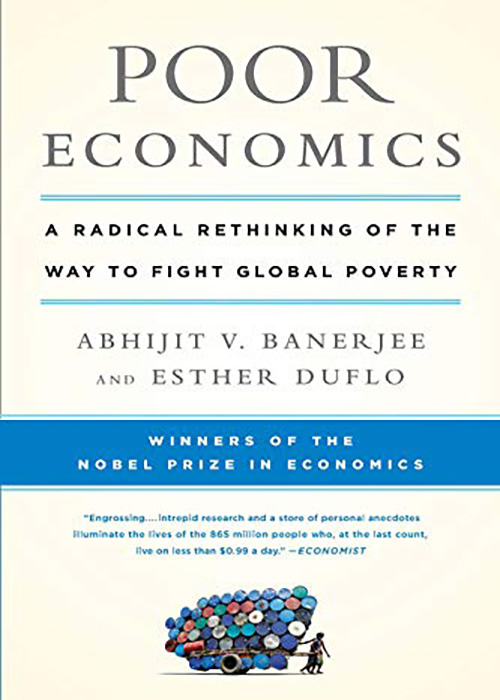
Semester: Spring 2016
Group Leader: David Frank, Faculty
Roughly a billion people live on less than a dollar a day and another two billion people live on less than two dollars a day. What is the best way to help these people escape poverty? Some advocate massive investments in foreign aid, others argue that such aid is wasteful or otherwise problematic, still others advocate for various structural or institutional reforms. Why does economic development happen in some nations while others are still mired in poverty? In Poor Economics, Banerjee and Duflo discuss the empirical evidence (or lack thereof) for these and other theories in development economics, which should have implications for how we ought to respond to the pressing problem of global poverty. Along the way we will consider relevant ethical questions about economic development: Why is economic development a good thing? Do people in rich countries have a duty to aid the global poor?
Emotions in Philosophy, Politics, and Economics: Selected Readings
By Martha Nussbaum, Robert Frank
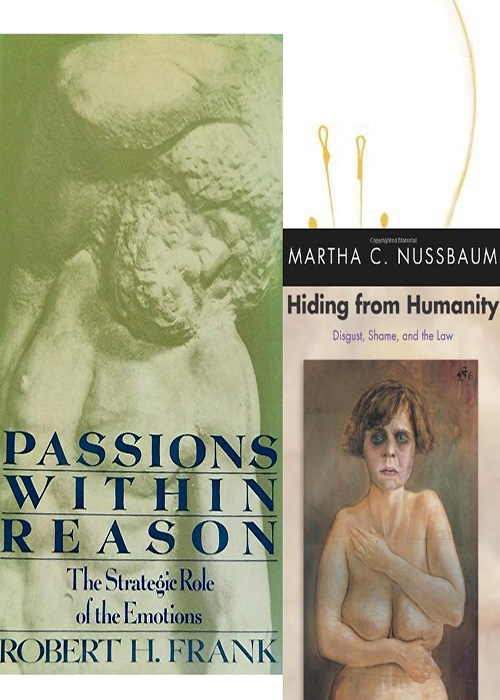
Semester: Spring 2016
Group Leader: Lauren Townsend, Affiliated Graduate Student
What are emotions and what do they do? Are they opposed to reason? These questions undergird many foundational questions in philosophy, politics, and economics from moral theories grounded in sentiment to economic models that assume perfect rationality. In this group we will read and analyze two different views of emotion: Robert Frank’s Passions Within Reason: The Strategic Role of Emotions which uses ideas from economics to explore how emotions have helped humans survive and develop as well as parts of Martha Nussbaum’s Hiding From Humanity which discusses whether shame and disgust are legitimate bases for policies and legal judgments. Through the two books we will explore ways emotion informs, supports, or is part of what might be called rationality as well as ways emotion might obscure good reasoning.
The Philosophy of Hebrew Scripture
By Yoram Hazony
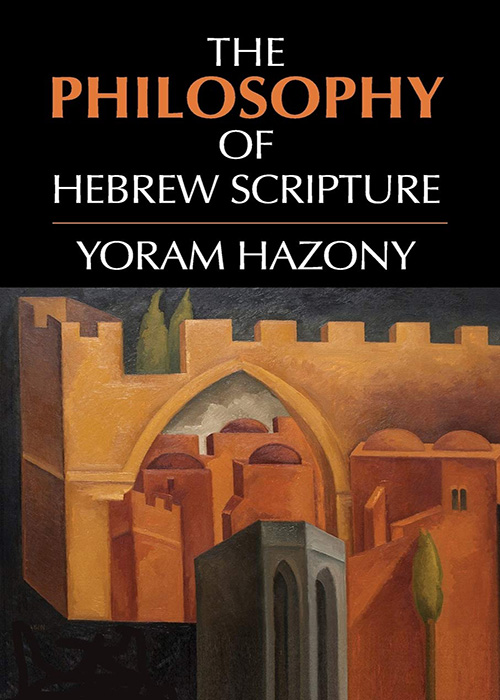
Semester: Spring 2016
Group Leader: Joshua Blanchard, Faculty
The Hebrew Scriptures are arguably the most influential texts in western literature and thought, having implications for a range of issues relevant to Philosophy, Politics and Economics including just war theory, distributive justice, the formation and purpose of the state. In this reading group, we will read Yoram Hazony’s recent book, The Philosophy of Hebrew Scripture, alongside passages from the Hebrew Bible that bear especially on questions of organizing a state and its economy. Following Harzony, in the reading group we will be focusing on the Hebrew texts not as “texts of revelation” but as “texts of reason” and engaging directly with the arguments they offer. Readings and discussion will all be in English, and no background in ancient history, theology, Jewish studies, or related fields will be presupposed.
Resisting Reality: Social Construction and Social Critique
By Sally Haslanger
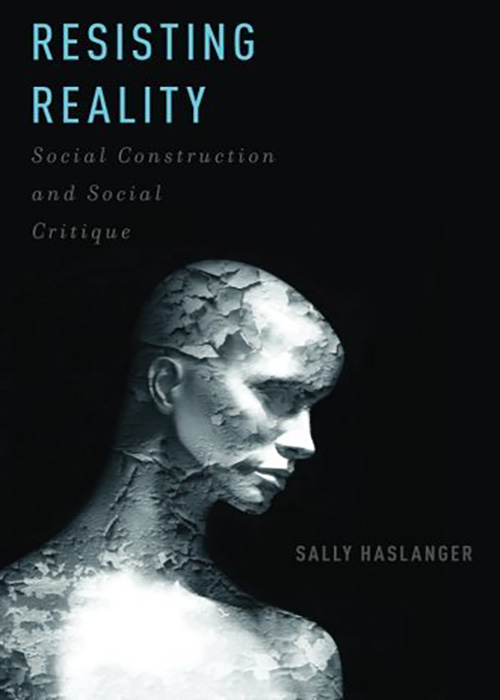
Semester: Fall 2015
Group Leader: Brookes Brown, Faculty
Statements about gender and race pervade our politics and our ethical lives. Some declare that there are natural differences between men and women, others argue that notions like race and gender are social constructs. Such claims have real impacts on our public policies and our day-to-day interactions. In her recent book, Resisting Reality, the philosopher Sally Haslanger considers statements like these. In a series of wide-ranging essays that explore issues in philosophy of language, epistemology, ethics and more, Haslanger examines what we mean by reality, what defines something as natural, how our ways of describing and categorizing the world shape our experiences and social interactions, and what- if anything- can be done to help us see our circumstances clearly, and resist that reality where it demands change. In this reading group, we will analyze and critically assess Haslanger’s arguments and discuss the broader implications of her claims.
The Heart of Human Rights
By Allen Buchanan
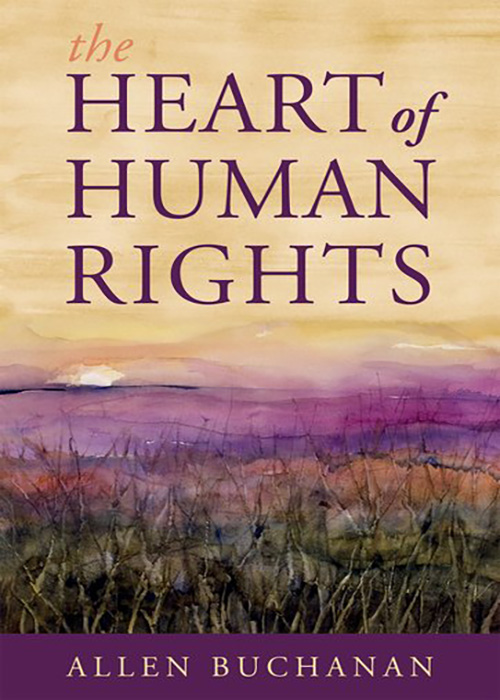
Semester: Fall 2015
Group Leader: Chris Melenovsky, Faculty
Human rights have become a foundational idea in international law, and this reading group will examine and evaluate the role of human rights in international practice. Is a “human right” primarily a legal or moral concept? How does international law put the idea of a human right into practice? Does an argument for human rights needs be grounded in any specific moral or religious perspective? Is it a good thing that international law focuses on human rights? To investigate these questions, we will focus on Allen Buchanan’s 2013 book, The Heart of Human Rights, which argues that value of international human rights law transcends the protection of moral rights. We will compare Buchanan’s approach to alternative approaches. By the end, we will better understand how human rights are used in the international context and whether it is good that they are used this way.
Capital in the Twenty-First Century
By Thomas Piketty
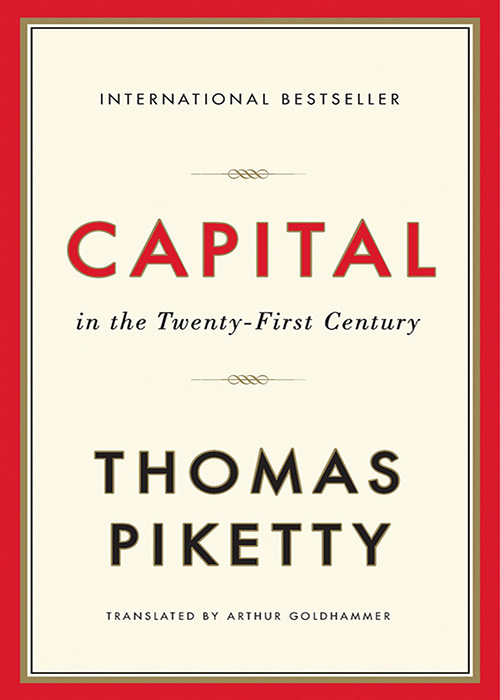
Semester: Spring 2015
Group Leader: Barry Maguire, Faculty
What exactly is the relationship between capitalism and inequality? This was the topic of Karl Marx’s Capital in the 19th century, and it is the topic of Thomas Piketty’s Capital in the Twenty-First Century. Piketty’s book draws on many years of collaborative economic research, and a huge amount more data than Marx had available. Piketty argues that capitalism leads to greater inequality. He maintains that the period of increasing equality of opportunity in the middle of the 20th century was anomalous, explained by high tax rates and the nationalization of capital during the wars. These claims and arguments have been widely praised and widely condemned. This book is a rare example of scholarly work becoming a best seller amongst non-academics. Piketty writes elegantly and accessibly, and provides historical and academic context to his arguments, which makes his claims interesting to both those with and without a background in economics. In this reading group, we will work through Piketty’s book and survey one or two of the many responses to it.
The Problem of Political Authority: An Examination of the Right to Coerce and the Duty to Obey
By Michael Huemer
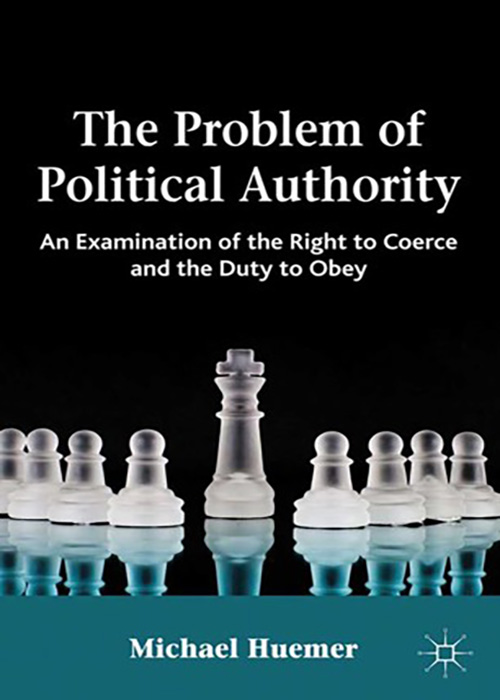
Semester: Spring 2015
Group Leader: Jonathan Anomaly, Faculty
Human rights have become a foundational idea in international law, and this reading group will examine and evaluate the role of human rights in international practice. Is a “human right” primarily a legal or moral concept? How does international law put t
The Rational Optimist: How Prosperity Evolves
By Matt Ridley
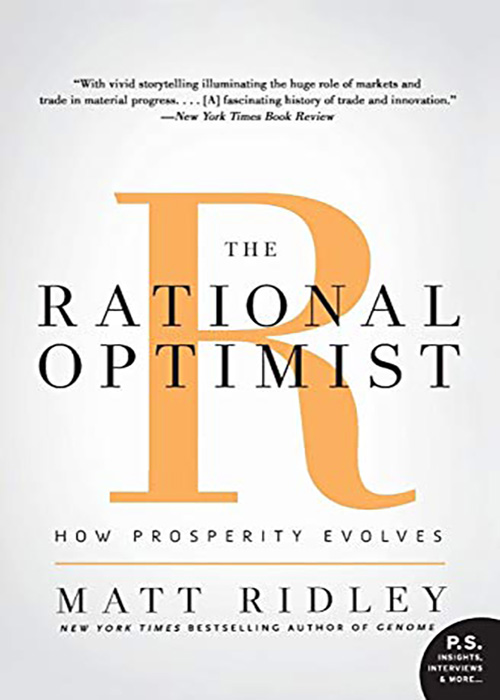
Semester: Fall 2014
Group Leader: Jonathan Anomaly, Faculty
Ever since Thomas Malthus predicted that population growth would inevitably lead to war, famine and resource depletion, economics has been called “the dismal science.” But in his recent book, The Rational Optimist, Matt Ridley challenges the pessimistic predictions of Malthusians and argues that market exchange has produced so much wealth and innovation that we have become “the only species that grows more prosperous as it grows more populous.” Ridley weaves together insights from Adam Smith, David Ricardo, and Friedrich Hayek to argue, among other things, that the prosperity markets make possible diminishes the incentives for slavery and war, and increases both food production and natural resource conservation. This reading group will discuss and critically assess Ridley’s core arguments and evidence.
Feminist Arguments For and Against the Market: Selected Readings
By
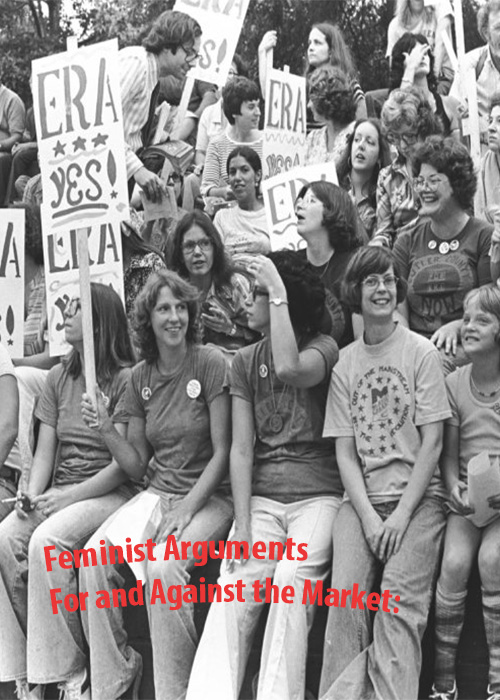
Semester: Fall 2014
Group Leader: John Lawless, Faculty
Feminism has been among the most important reformist movements in the past century, focused on the promotion of gender equality and to the freedom of all. It has had a complex—sometimes even contentious—relationship with the free market. Many feminists have seen institutions protecting private property and the right to free trade as essential to the feminist project; others have argued that the free market—at least in the context of a sexist society—inevitably contributes further to women’s oppression. In this reading group, we will survey a eight styles of feminist arguments for and agains the market, locating these arguments within the various forms of feminism that give them context. Readings will include classical liberals, Rawlsians, anarchist feminists, Marxist feminists, feminists who argue for an ethic of care, and radical feminists who reject the formal equality of the market.
Distributive Justice: Selected Readings
By John Rawls and Robert Nozick

Semester: Fall 2014
Group Leader: Joshua Blanchard, Faculty
John Rawls and Robert Nozick produced what are arguably the two most influential books in political philosophy in the 20th century. In this reading group, we will read key passages from both Rawls and Nozick side by side. In so doing, we will compare and contrast Rawls’ liberalism and Nozick’s libertarianism as they are applied to a variety of problems. Hence, our discussions will be as wide-ranging as theirs, covering theories of rights, entitlement, the role of the state, property, the nature of justice, utopian ideals, reflective equilibrium, and much else.
Democracy in America (Vol. II)
By Alexis de Tocqueville

Semester: Spring 2014
Group Leader: Alexander Jech, Faculty
Democracy in America has been called both the best book ever written about democracy and the best book ever written about America. Published in two parts, one in 1835 and the second in 1840, its insights about democracy and the American character have led both liberals and conservatives, including every President since Eisenhower, to claim de Tocqueville as their own, but his work is more often cited than understood. In the Fall we discussed Tocqueville treatment of the influence of democracy on political institutions, and this Spring we will examine Tocqueville’s provocative ideas and arguments regarding the nature of democratic society, discussing his analysis of the influence of democracy on intellectual currents, popular sentiments, social customs, and political society broadly. This semester’s reading group does not presuppose that students have already read anything by Tocqueville and is open to both newcomers and those who were enrolled in last Fall’s reading group.
Marx: Selected Readings
By Karl Marx

Semester: Spring 2014
Group Leader: John Lawless, Faculty
Karl Marx’s political and economic thought left vivid marks on the twentieth century, and he remains one of the most influential and systematic critics of classical liberalism and capitalism. At the heart of much of his work are a host of compelling but deeply controversial ideas: that persons are set apart from nature through their labor; that it is our labor—and in particular, our productive relations with those around us—that give shape to our art and culture and drive history forward; and that these productive relations under capitalism leave us alienated, render our lives meaningless and make us inhuman. For Marx, these ideas justify a hope for a communist society in which capitalist relations will be undone and, for the first time, all persons will be truly free. In this reading group, we’ll be examining Marx’s concepts of the human being, of labor, and of alienation, and come to grips with his philosophy of history before turning to important liberal critiques of Marx’s system.
Economics in Literature: Selected Readings
By George Orwell, Ayn Rand, Upton Sinclair, Virginia Woolf

Semester: Fall 2013
Group Leader: Dan Layman, Faculty
Economic concerns infuse almost every aspect of our lives. Many of the fundamental oppositions that structure human experience— independence and confinement, opportunity and disappointment, identity and difference—hinge on economic institutions, policies, and innovations. It should come as no surprise, then, that some of the world’s most talented literary authors have found fertile subject matter in economics. In this reading group, we will read and discuss a selection of important works of economically-oriented literature with a view to appreciating how economic commitments and concerns spanning the entire political spectrum have come alive in literary classics. The reading list will include the following: George Orwell, Down and Out in Paris and London; Ayn Rand, Anthem; Upton Sinclair, The Jungle; Virginia Woolf, A Room of One’s Own.
The Theory of Moral Sentiments
By Adam Smith

Semester: Fall 2013
Group Leader: John Lawless, Faculty
Adam Smith was one of the most influential theorists of the 18th century. Economists know him mainly for his groundbreaking text, The Wealth of Nations, but it is in The Theory of Moral Sentiments that Smith develops his accounts of human psychology, value, and rights. Like most important thinkers, Smith was a powerfully systematic thinker; in this reading group, we will be reading all of The Theory of Moral Sentiments both in order to make sense of it as a work, and to develop a sense of the ways in which it might relate to Smith’s broader economic and political theories. We will focus heavily on the primary text, but secondary readings and selections from elsewhere in Smith’s corpus will be added to provide further insight and context.
Democracy in America (Vol. I)
By Alexis de Tocqueville

Semester: Fall 2013
Group Leader: Alexander Jech, Faculty
Democracy in America has been called both the best book ever written about democracy and the best book ever written about America. Published in two parts, one in 1835 and the second in 1840, its insights about democracy and the American character have led both liberals and conservatives, including every President since Eisenhower, to claim de Tocqueville as their own, but his work is more often cited than understood. In the Fall we discussed Tocqueville treatment of the influence of democracy on political institutions, and this Spring we will examine Tocqueville’s provocative ideas and arguments regarding the nature of democratic society, discussing his analysis of the influence of democracy on intellectual currents, popular sentiments, social customs, and political society broadly. This semester’s reading group does not presuppose that students have already read anything by Tocqueville and is open to both newcomers and those who were enrolled in last Fall’s reading group.
